Special Report
This Is What Every State Is Doing to Manage Schools During the COVID-19 Pandemic
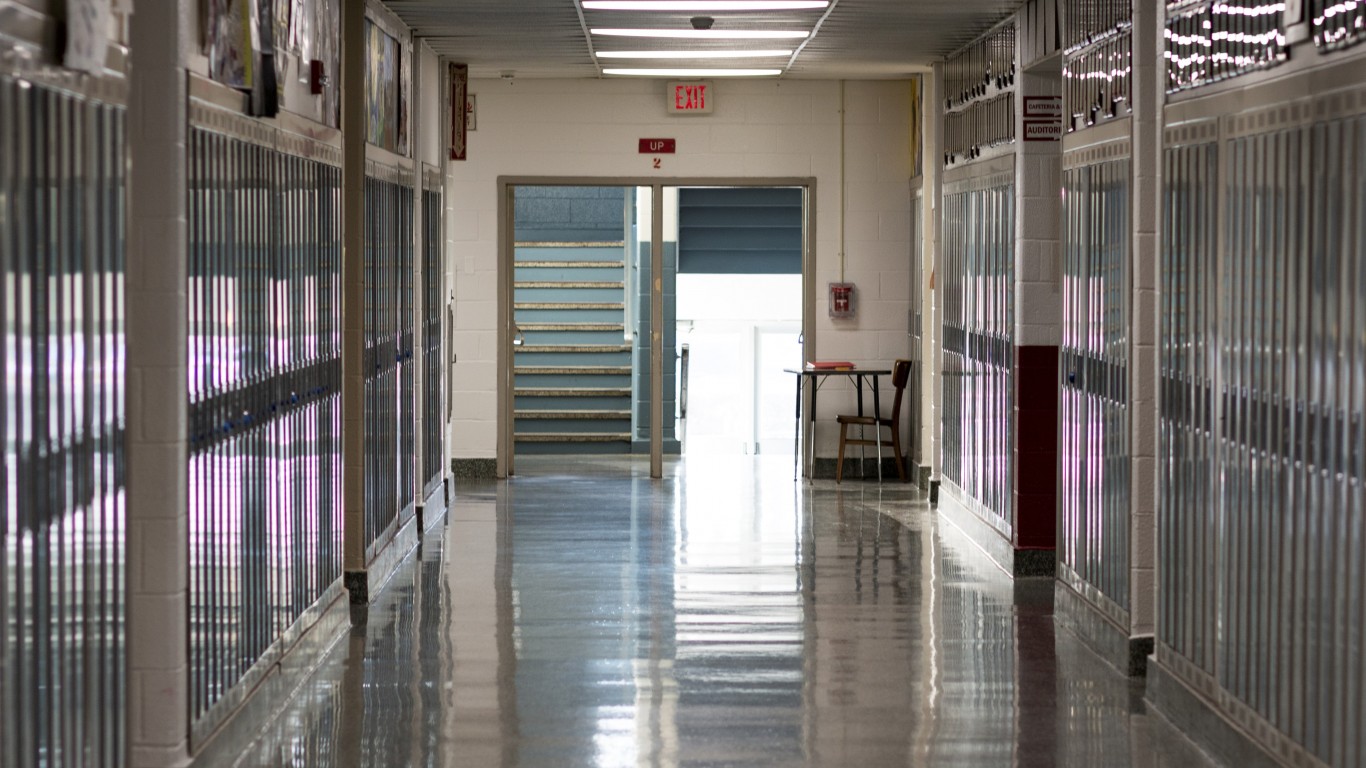
Published:

Though new coronavirus cases have been falling across the U.S. for at least about three weeks, school districts all over the country continue to temporarily close schools due to spikes in cases in local communities. School districts have been left to develop their own plans for dealing with a potential COVID-19 surge in their schools — and the measures school officials take to contain the spread change almost weekly.
24/7 Wall St. reviewed guidelines released by state governors and health and education departments as well as local news articles to create a current list of school health safety measures and re-closures in every state.
In an effort to make school closures more predictable, many school districts have established a threshold for the number of confirmed COVID-19 cases per student and staff. That way, parents know if a closure is imminent and can prepare in advance. Some schools have started administering COVID-19 rapid tests as a way to minimize the risk of transmission and remain open.
Some states have come up with plans to keep schools open as long as possible. Such guidelines include students or staff not even having to quarantine if the people who have been exposed to COVID-19 were wearing masks and are not exhibiting any of the disease’s symptoms.
A few districts have chosen the opposite approach — to remain closed in all but a few scenarios. Schools in Los Angeles, for example, won’t reopen for in-person instruction while infection rates are high in local communities and until teachers are vaccinated.
Though school districts are increasingly holding off resuming in-person classes until teachers receive the vaccine, several states have not reached a distribution phase that covers educators. Each state has set priorities for who can get the vaccine first, based on recommendations from the federal government — here are the COVID-19 vaccination priorities in each state.
Click here to see what every state is doing to manage schools during the COVID-19 pandemic
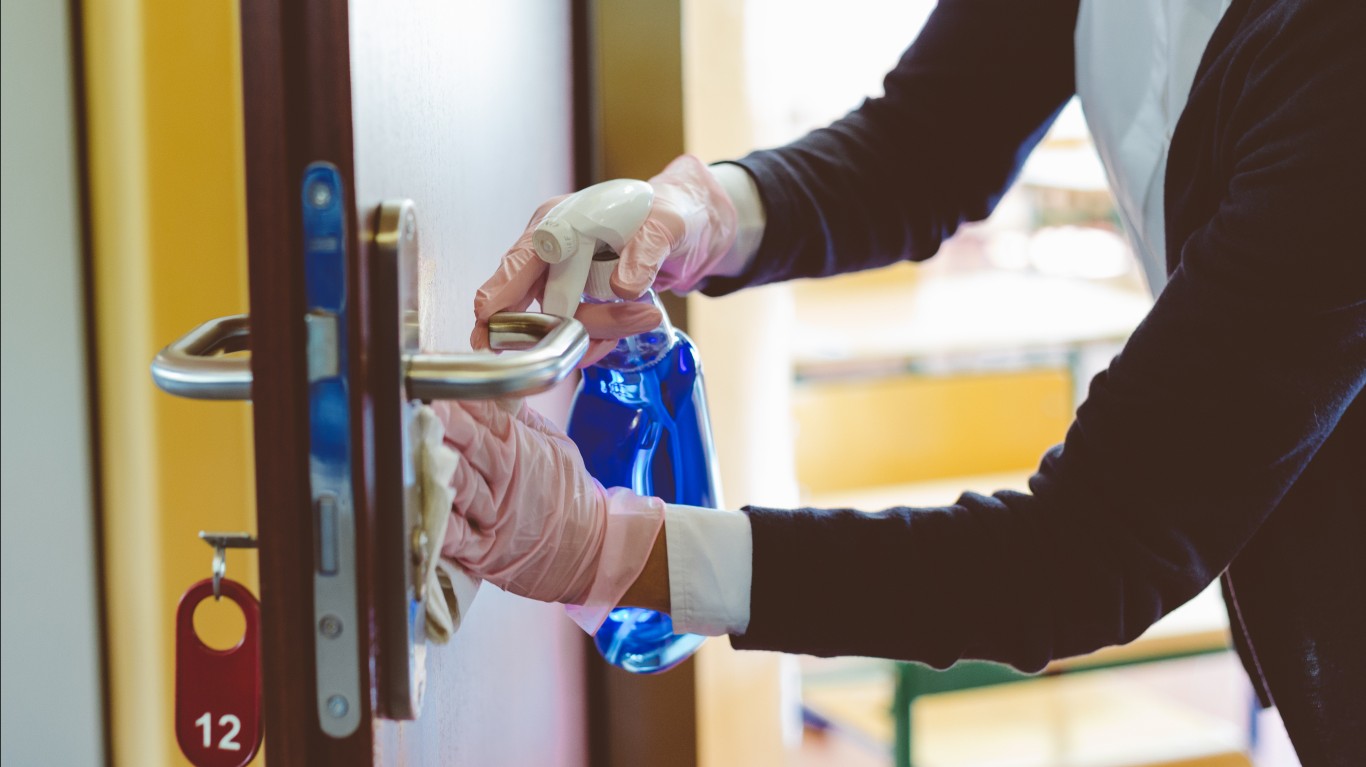
Alabama
> Current measures taken: Several counties delayed the start of in-person instruction in the second semester. Montgomery Public Schools reverted to an all-virtual format on Feb. 1
> Health screening recommendations: Daily temperature checks
> COVID-19 cases as of Feb 8: 9,684 per 100,000 people — 12th highest (total: 473,348)
> Change avg. daily cases, Jan 31 – Feb 7: 2.8% — 25th largest increase (from 459,639 to 472,423)
> Vaccine 2 doses administered as of Feb 8: 1,810 per 100,000 people — the lowest (total: 88,453)
> Population: 4.9 million
[in-text-ad]
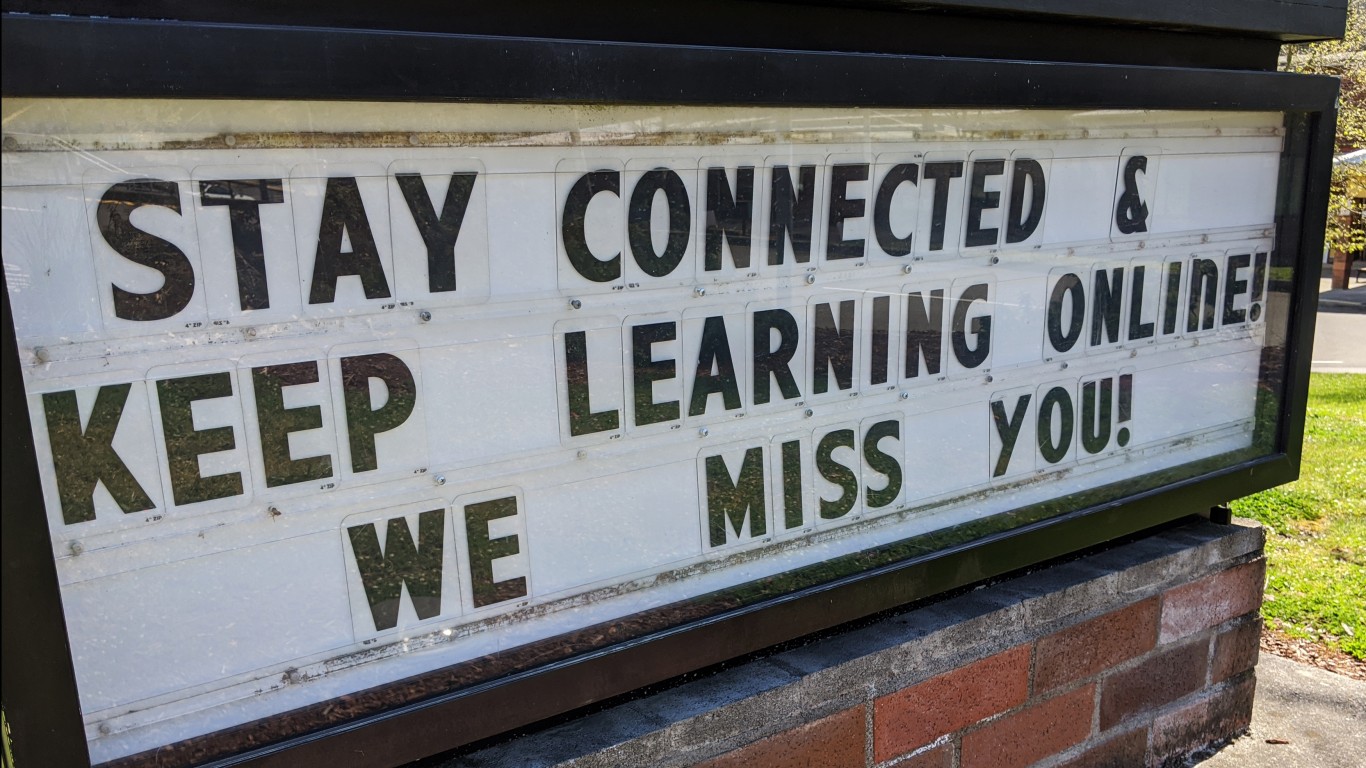
Alaska
> Current measures taken: Five Mat-Su schools temporarily closed to in-person learning in Feb. after several positive cases. Several large school districts started reopening to in-person learning in Jan. 2021. Anchorage School District reopened on Jan. 19.
> Health screening recommendations: Daily temperature and symptom screening for all
> COVID-19 cases as of Feb 8: 7,493 per 100,000 people — 14th lowest (total: 55,259)
> Change avg. daily cases, Jan 31 – Feb 7: 1.7% — 11th smallest increase (from 54,351 to 55,259)
> Vaccine 2 doses administered as of Feb 8: 5,534 per 100,000 people — 2nd highest (total: 40,812)
> Population: 737,000
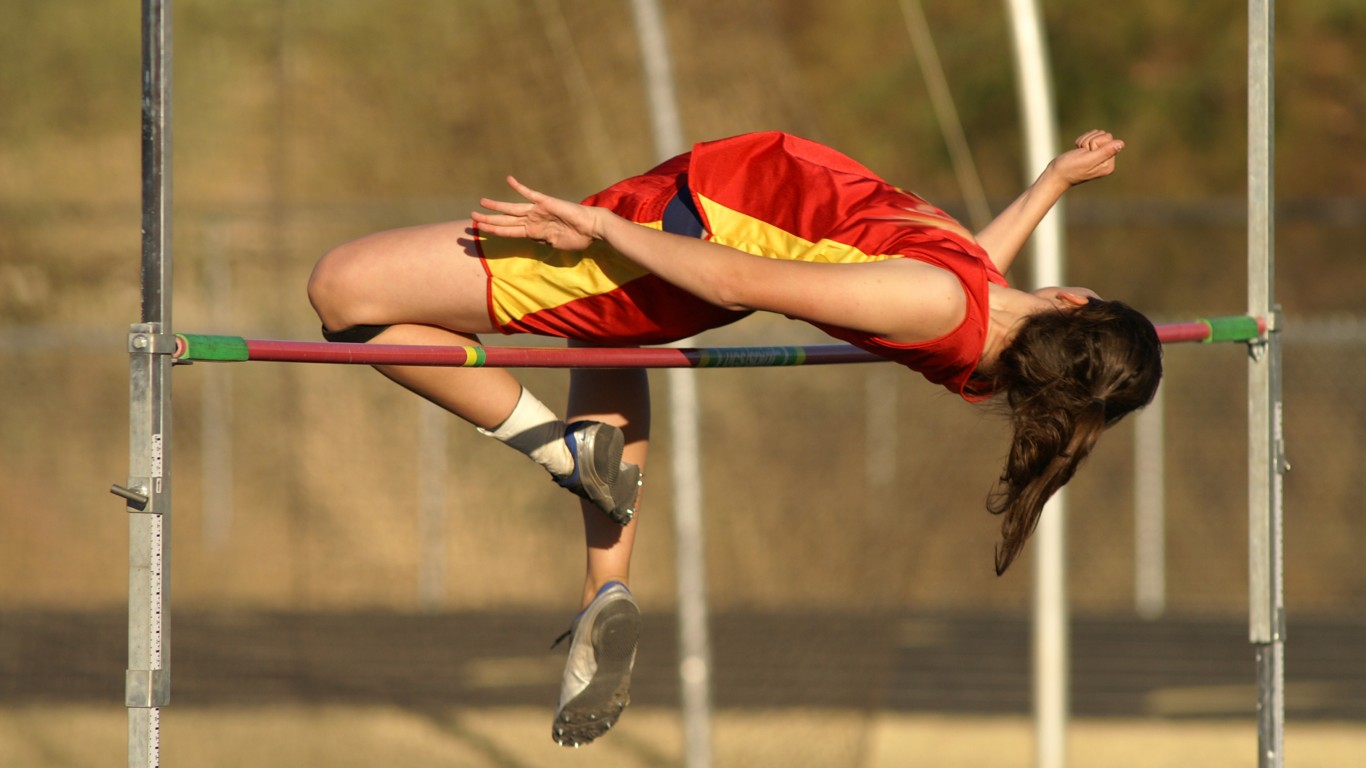
Arizona
> Current measures taken: The largest public school district moved to remote learning. K-12 teachers in Mesa and other areas are eligible for COVID-19 vaccine.
> Health screening recommendations: Daily symptom screening and temperature checks
> COVID-19 cases as of Feb 8: 10,916 per 100,000 people — 6th highest (total: 782,887)
> Change avg. daily cases, Jan 31 – Feb 7: 2.9% — 22nd largest increase (from 758,404 to 780,637)
> Vaccine 2 doses administered as of Feb 8: 2,249 per 100,000 people — 7th lowest (total: 161,324)
> Population: 7.2 million
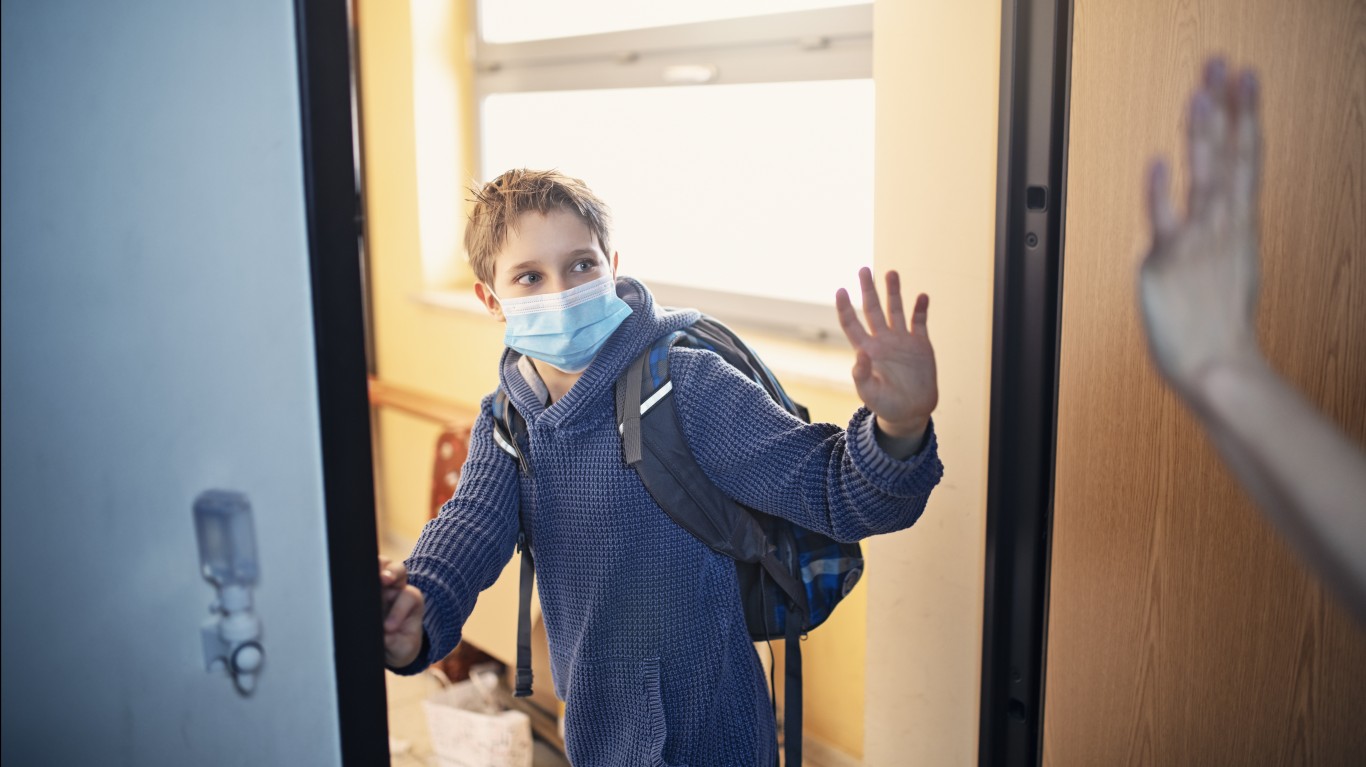
Arkansas
> Current measures taken: Dozens of schools have moved to remote learning. At least one school in Earle School District went remote indefinitely. Educators have been able to get vaccinated as of Jan 18.
> Health screening recommendations: To have screening stations and screening signs
> COVID-19 cases as of Feb 8: 10,199 per 100,000 people — 9th highest (total: 307,373)
> Change avg. daily cases, Jan 31 – Feb 7: 3.9% — 9th largest increase (from 295,268 to 306,736)
> Vaccine 2 doses administered as of Feb 8: 3,121 per 100,000 people — 20th highest (total: 94,058)
> Population: 3.0 million
[in-text-ad-2]
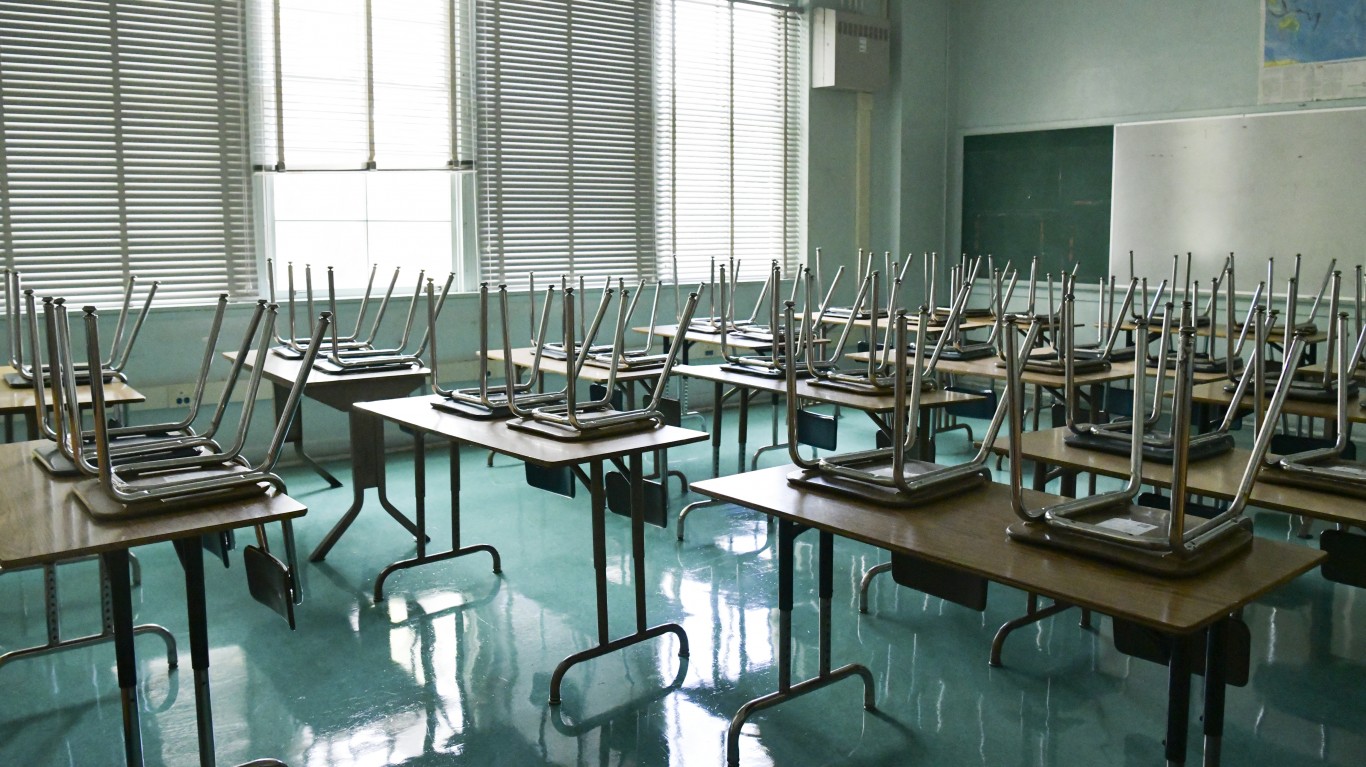
California
> Current measures taken: Almost all K-12 students are in the purple “widespread” tier and can’t begin offering in-person instruction. Schools are required to close when 5% of staff and students test positive for COVID-19 within a 14-day period. Schools in Los Angeles won’t reopen for in-person instruction while infection rates are high in local communities and teachers are not vaccinated.
> Health screening recommendations: Daily symptom screening and temperature checks, hand-washing required before entering school
> COVID-19 cases as of Feb 8: 8,460 per 100,000 people — 25th lowest (total: 3,346,340)
> Change avg. daily cases, Jan 31 – Feb 7: 2.9% — 23rd largest increase (from 3,243,348 to 3,335,926)
> Vaccine 2 doses administered as of Feb 8: 2,144 per 100,000 people — 5th lowest (total: 847,993)
> Population: 39.6 million
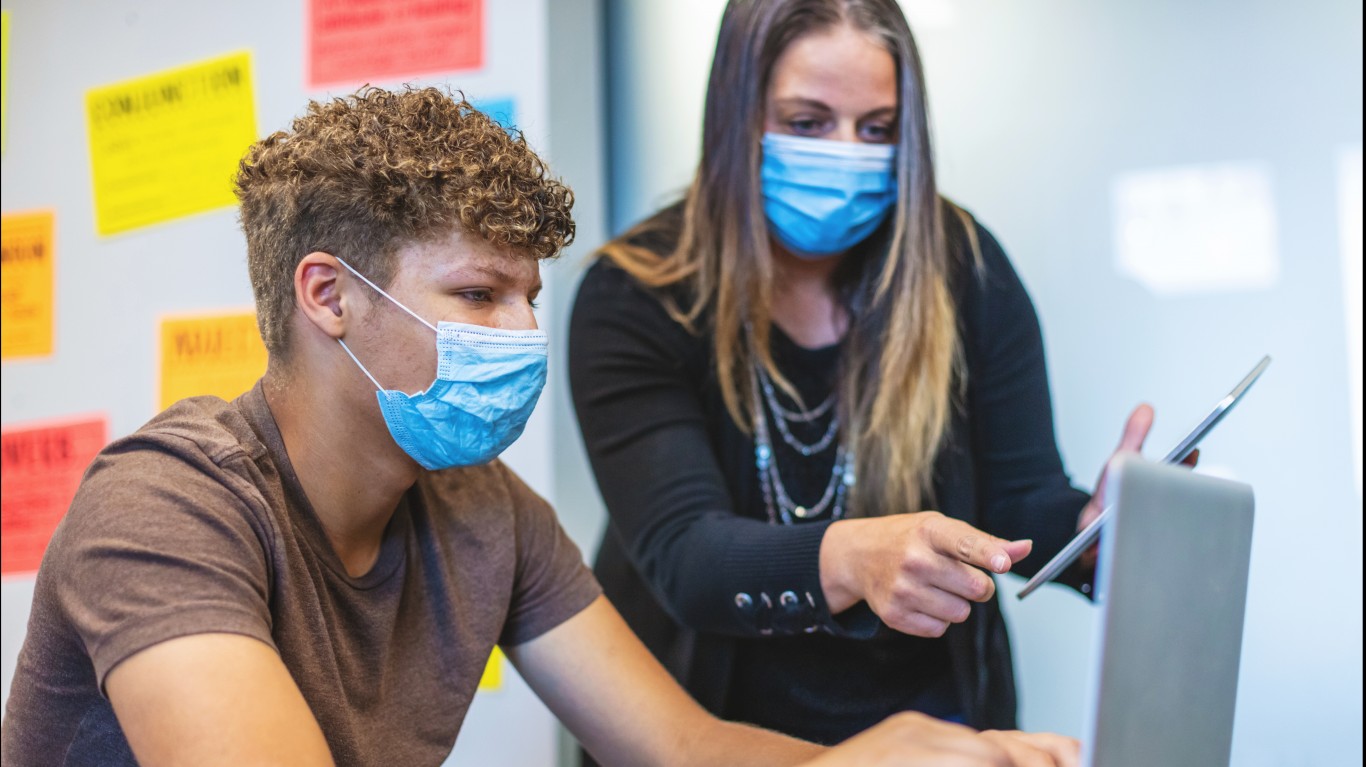
Colorado
> Current measures taken: Many of the biggest school districts in Colorado are fully remote. Public schools in Denver started the spring semester remotely, phasing kids back into classrooms. At least 30 schools have reported COVID-19 outbreaks in January 2021.
> Health screening recommendations: At-home or on-site symptom screening and temperature checks
> COVID-19 cases as of Feb 8: 7,116 per 100,000 people — 12th lowest (total: 405,289)
> Change avg. daily cases, Jan 31 – Feb 7: 2.3% — 19th smallest increase (from 395,016 to 404,255)
> Vaccine 2 doses administered as of Feb 8: 3,651 per 100,000 people — 10th highest (total: 207,951)
> Population: 5.7 million
[in-text-ad]
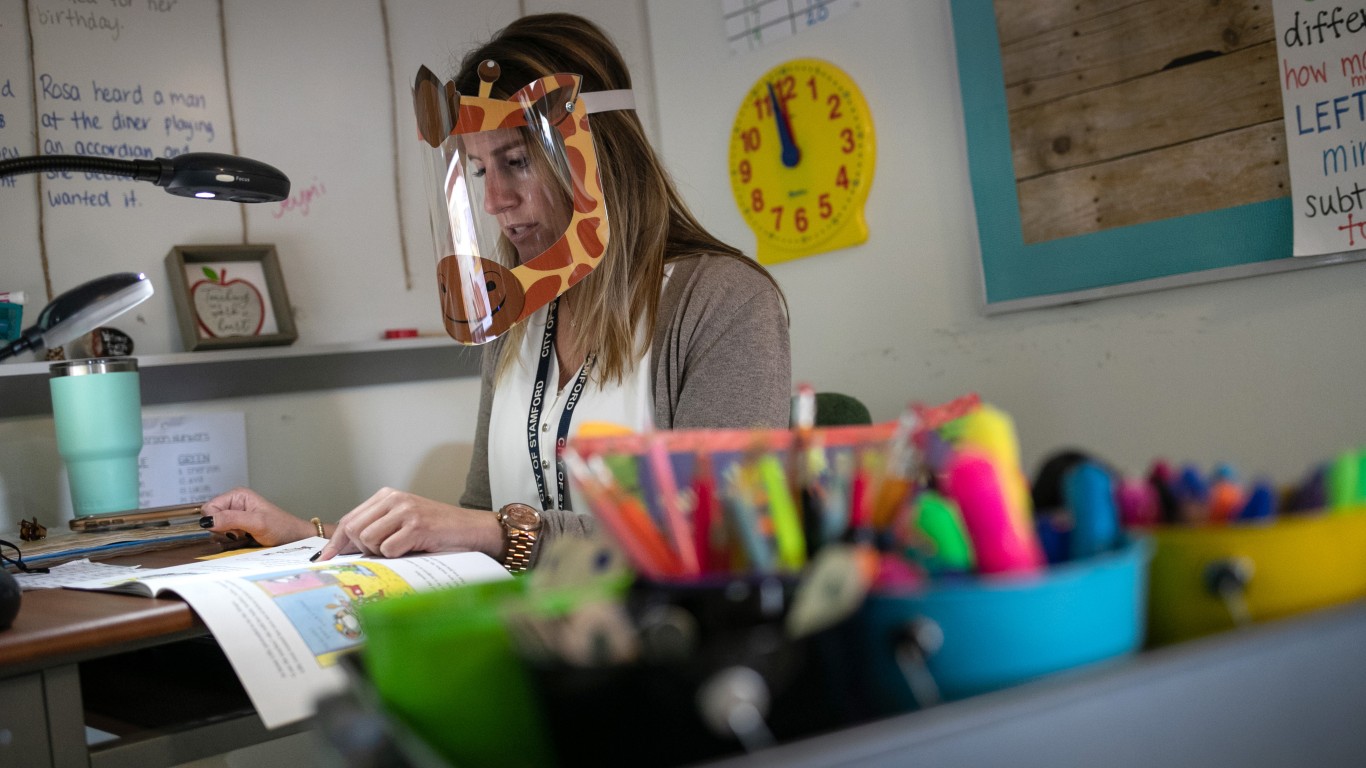
Connecticut
> Current measures taken: Schools are advised to close if they are in an area with an average of 25+ new cases per 100,000 residents in a week.
> Health screening recommendations: To maximize social distancing and for students to bring their own water
> COVID-19 cases as of Feb 8: 7,260 per 100,000 people — 13th lowest (total: 259,372)
> Change avg. daily cases, Jan 31 – Feb 7: 3.7% — 11th largest increase (from 250,023 to 259,372)
> Vaccine 2 doses administered as of Feb 8: 3,560 per 100,000 people — 11th highest (total: 127,194)
> Population: 3.6 million
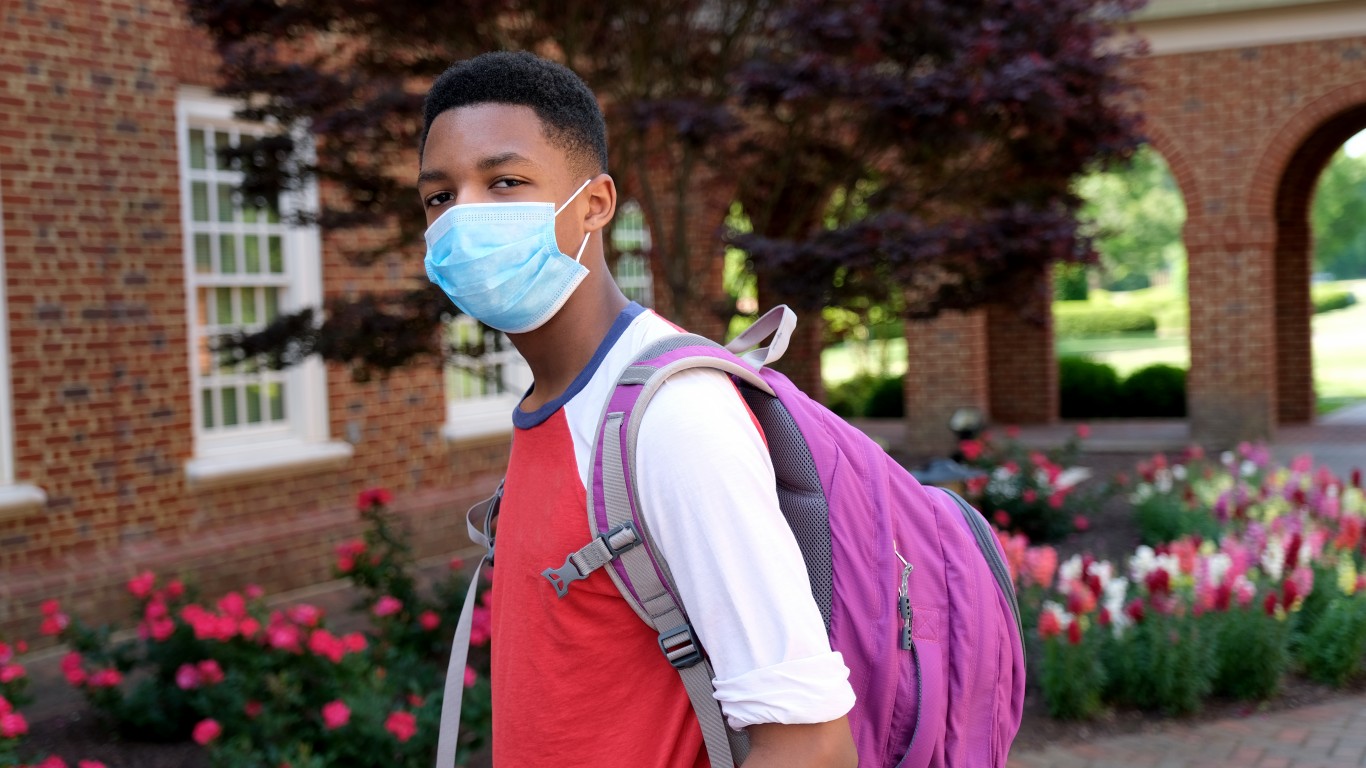
Delaware
> Current measures taken: Hybrid learning resumed on Jan. 11. Sports competitions have been canceled. The DOE is coordinating vaccination for 1,200 teachers and child care educators and school staff at the beginning of Feb.
> Health screening recommendations: Daily symptom screening and temperature checks at home. The state will provide testing for staff and students
> COVID-19 cases as of Feb 8: 8,368 per 100,000 people — 22nd lowest (total: 80,931)
> Change avg. daily cases, Jan 31 – Feb 7: 3.2% — 18th largest increase (from 78,071 to 80,594)
> Vaccine 2 doses administered as of Feb 8: 2,603 per 100,000 people — 19th lowest (total: 25,179)
> Population: 967,000
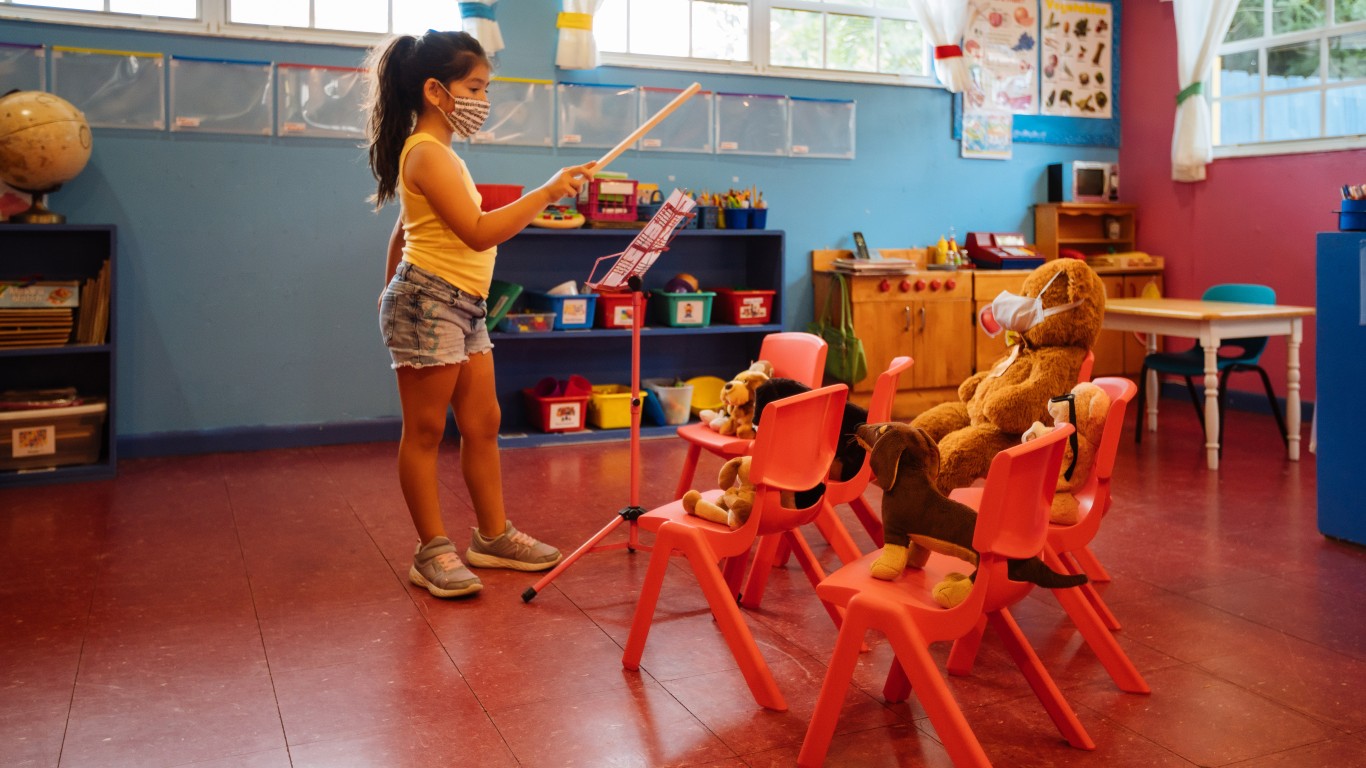
Florida
> Current measures taken: An executive order has been issued extending remote and hybrid learning options. Public schools in Polk County have seen a spike in coronavirus cases in January.
> Health screening recommendations: To set up secondary clinic for kids showing symptoms
> COVID-19 cases as of Feb 8: 8,375 per 100,000 people — 23rd lowest (total: 1,783,720)
> Change avg. daily cases, Jan 31 – Feb 7: 3.3% — 17th largest increase (from 1,721,377 to 1,777,983)
> Vaccine 2 doses administered as of Feb 8: 2,956 per 100,000 people — 22nd highest (total: 629,556)
> Population: 21.3 million
[in-text-ad-2]
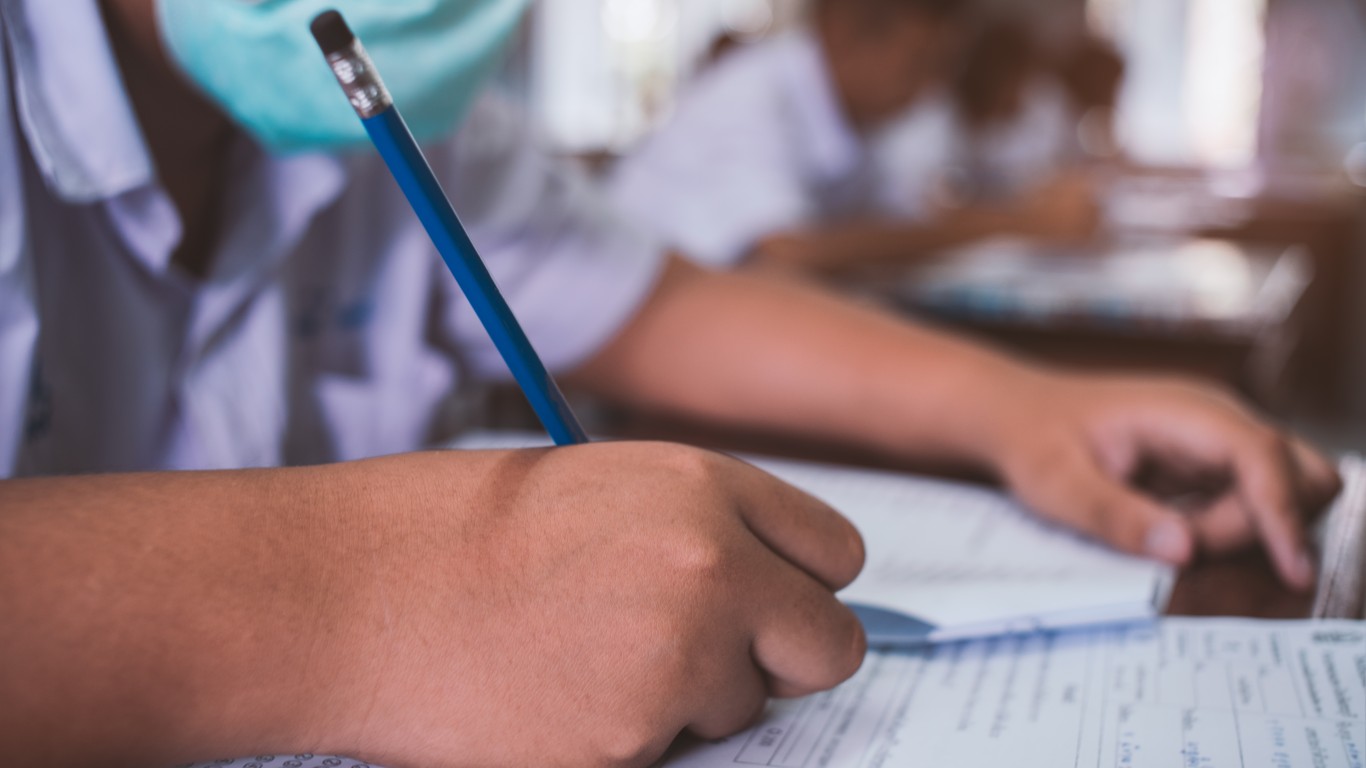
Georgia
> Current measures taken: Atlanta Public Schools, the largest school district in the state, delayed reopening for in-person instruction. Students in grades 3-12 will gradually return to classrooms starting Feb 8.
> Health screening recommendations: Daily temperature checks for all
> COVID-19 cases as of Feb 8: 8,971 per 100,000 people — 21st highest (total: 943,695)
> Change avg. daily cases, Jan 31 – Feb 7: 3.5% — 15th largest increase (from 909,445 to 940,991)
> Vaccine 2 doses administered as of Feb 8: 2,090 per 100,000 people — 4th lowest (total: 219,840)
> Population: 10.5 million
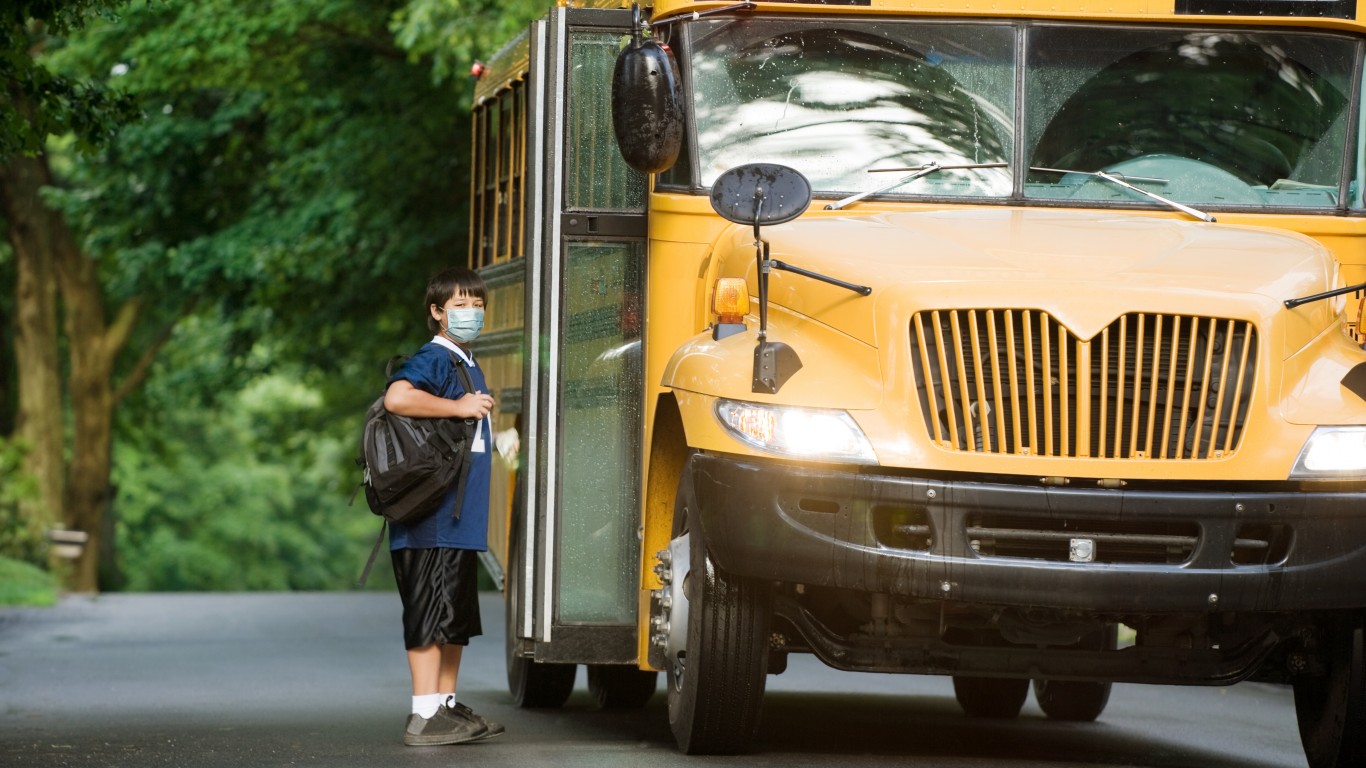
Hawaii
> Current measures taken: Some schools have been extending the first phase of reopening for in-person instruction, which consists of half-day classes for vulnerable students.
> Health screening recommendations: Daily symptom screenings
> COVID-19 cases as of Feb 8: 1,863 per 100,000 people — the lowest (total: 26,468)
> Change avg. daily cases, Jan 31 – Feb 7: 2.4% — 20th smallest increase (from 25,853 to 26,468)
> Vaccine 2 doses administered as of Feb 8: 2,990 per 100,000 people — 21st highest (total: 42,472)
> Population: 1.4 million
[in-text-ad]

Idaho
> Current measures taken: All schools in Boise School District went fully remote until mid-January. Some schools have started to require that all students and staff wear masks.
> Health screening recommendations: Daily symptom screening and temperature checks for all
> COVID-19 cases as of Feb 8: 9,418 per 100,000 people — 16th highest (total: 165,209)
> Change avg. daily cases, Jan 31 – Feb 7: 1.6% — 7th smallest increase (from 162,683 to 165,209)
> Vaccine 2 doses administered as of Feb 8: 2,047 per 100,000 people — 3rd lowest (total: 35,910)
> Population: 1.8 million
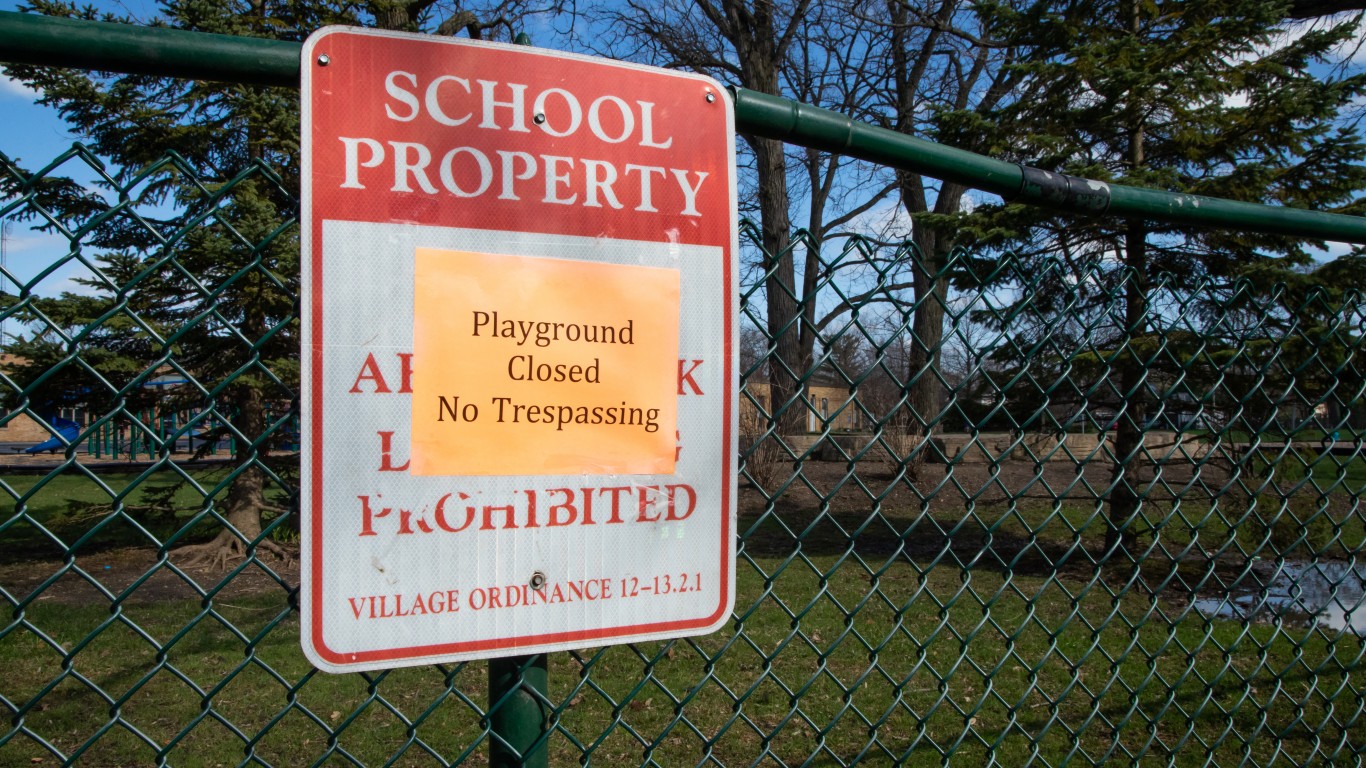
Illinois
> Current measures taken: Chicago Public Schools returned to in-person learning on Jan 11, but high school students continue remote. Catholic schools now have the option to transition to remote learning. K-12 teachers are now eligible for the COVID-19 vaccine.
> Health screening recommendations: Daily symptom screenings and temperature checks for all
> COVID-19 cases as of Feb 8: 8,795 per 100,000 people — 23rd highest (total: 1,120,528)
> Change avg. daily cases, Jan 31 – Feb 7: -0.5% — the only decrease (from 1,126,301 to 1,120,528)
> Vaccine 2 doses administered as of Feb 8: 2,348 per 100,000 people — 10th lowest (total: 299,201)
> Population: 12.7 million
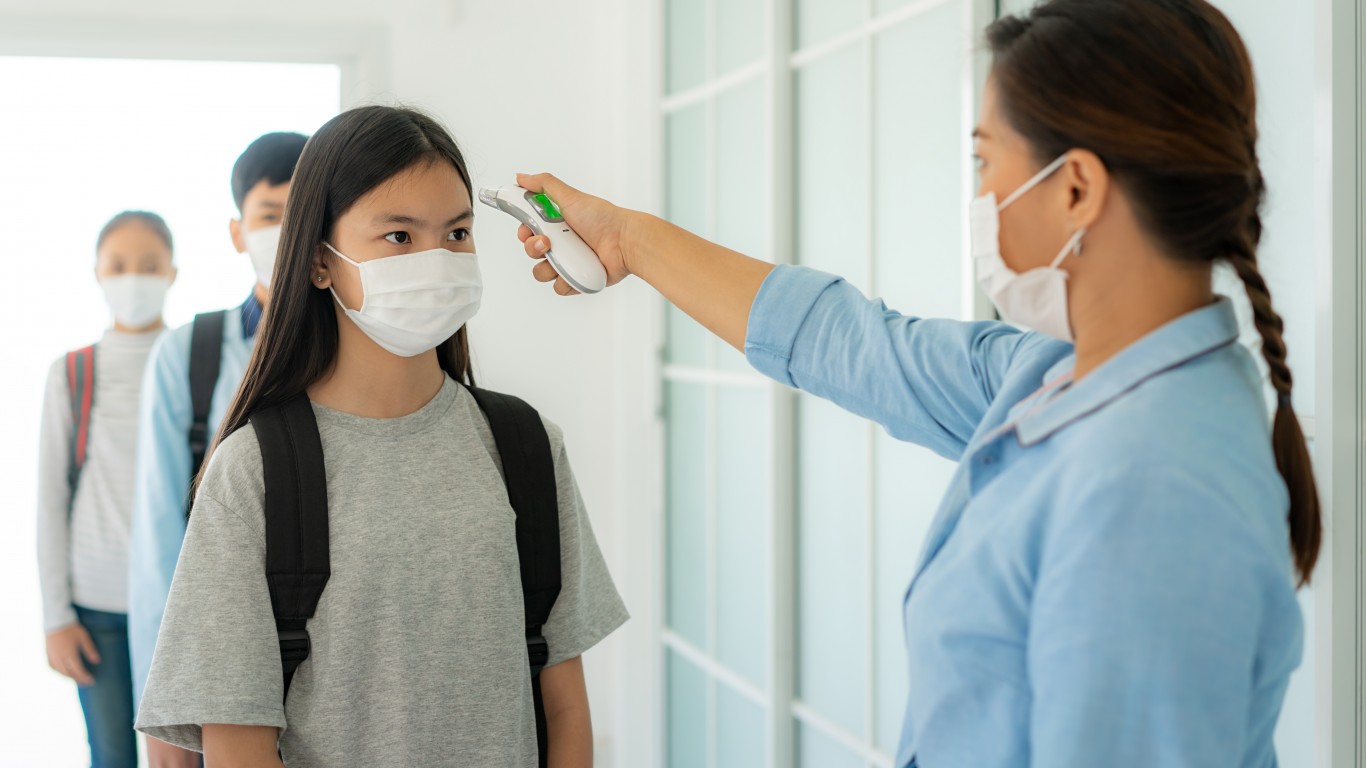
Indiana
> Current measures taken: Pre-K through 3rd grade students in Indianapolis returned to in-person learning full-time Jan 19. Students in higher grades did Jan 25. Quarantines are no longer recommended as long as the exposed students and teachers were at least 3 feet apart and were wearing masks.
> Health screening recommendations: Daily temperature checks
> COVID-19 cases as of Feb 8: 9,575 per 100,000 people — 13th highest (total: 640,744)
> Change avg. daily cases, Jan 31 – Feb 7: 2.1% — 16th smallest increase (from 626,682 to 639,711)
> Vaccine 2 doses administered as of Feb 8: 2,332 per 100,000 people — 8th lowest (total: 156,083)
> Population: 6.7 million
[in-text-ad-2]
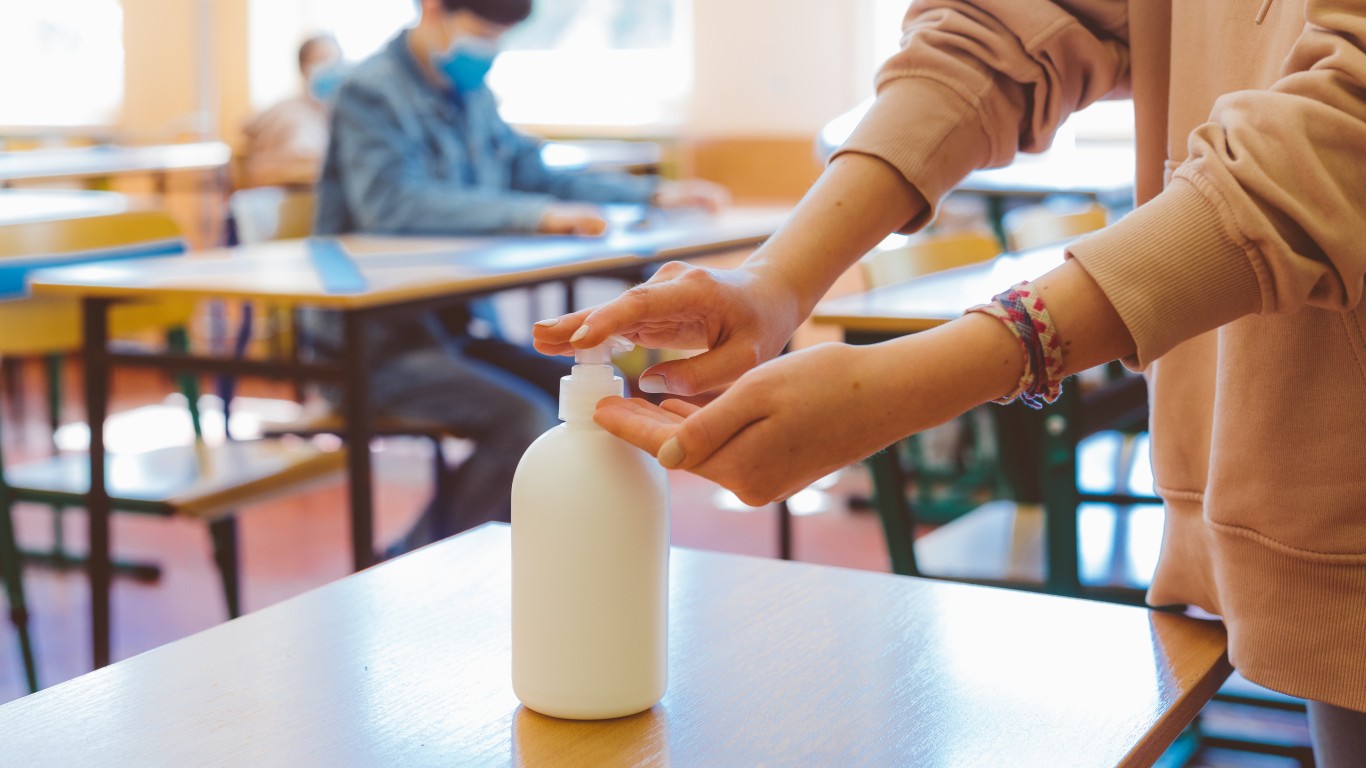
Iowa
> Current measures taken: Seven counties in the state have a 14-day rolling average positivity rate at or above 15%, which is the threshold that must be met before school districts can request to go to online-only learning.
> Health screening recommendations: Each school to come up with its own safety measures
> COVID-19 cases as of Feb 8: 10,287 per 100,000 people — 7th highest (total: 324,666)
> Change avg. daily cases, Jan 31 – Feb 7: 1.6% — 10th smallest increase (from 319,203 to 324,405)
> Vaccine 2 doses administered as of Feb 8: 2,836 per 100,000 people — 24th lowest (total: 89,506)
> Population: 3.2 million
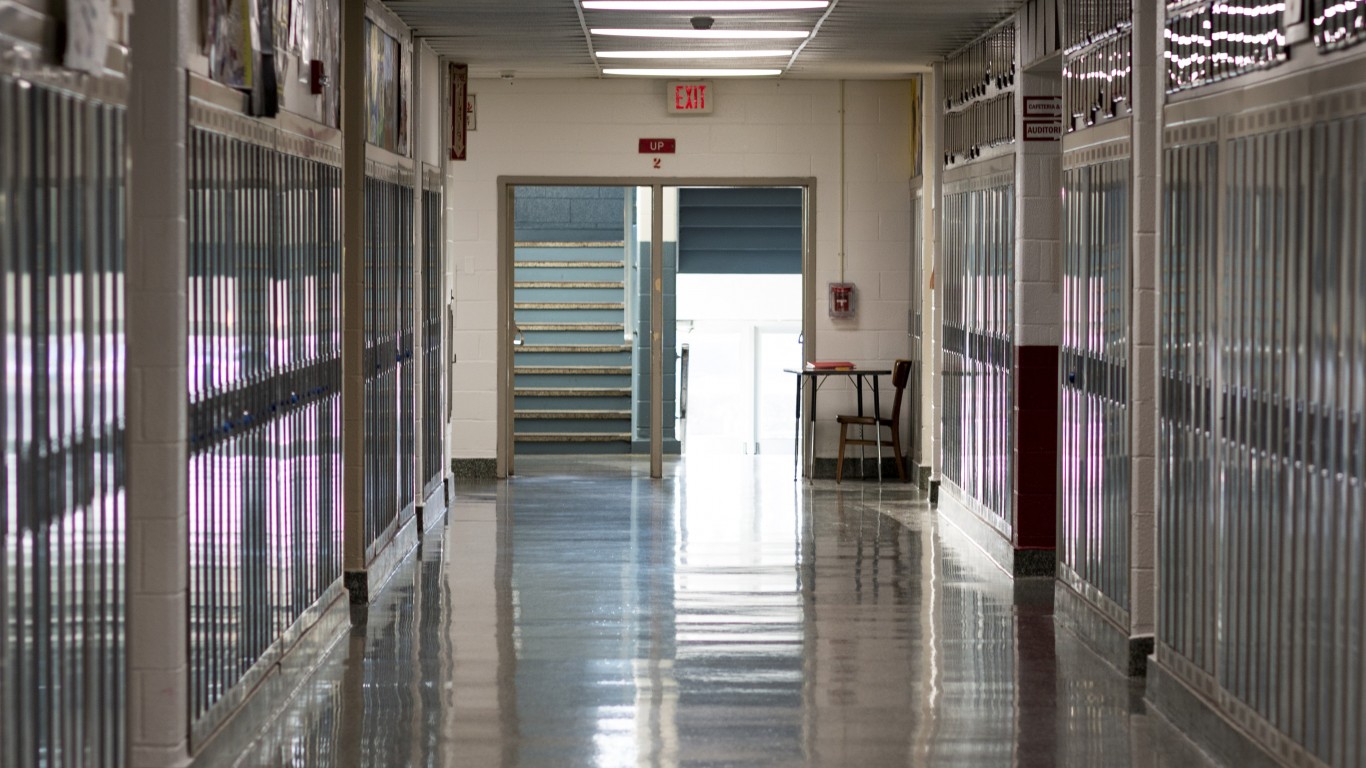
Kansas
> Current measures taken: Schools in small and big towns have moved classes online full-time. Wichita school district staff accounts for more than half of COVID-19 cases in the district since the start of the school year. Elementary schools in Wichita reopened in mid-January.
> Health screening recommendations: Daily temperature checks for staff
> COVID-19 cases as of Feb 8: 9,719 per 100,000 people — 11th highest (total: 282,960)
> Change avg. daily cases, Jan 31 – Feb 7: 2.5% — 22nd smallest increase (from 274,685 to 281,562)
> Vaccine 2 doses administered as of Feb 8: 2,355 per 100,000 people — 11th lowest (total: 68,565)
> Population: 2.9 million
[in-text-ad]
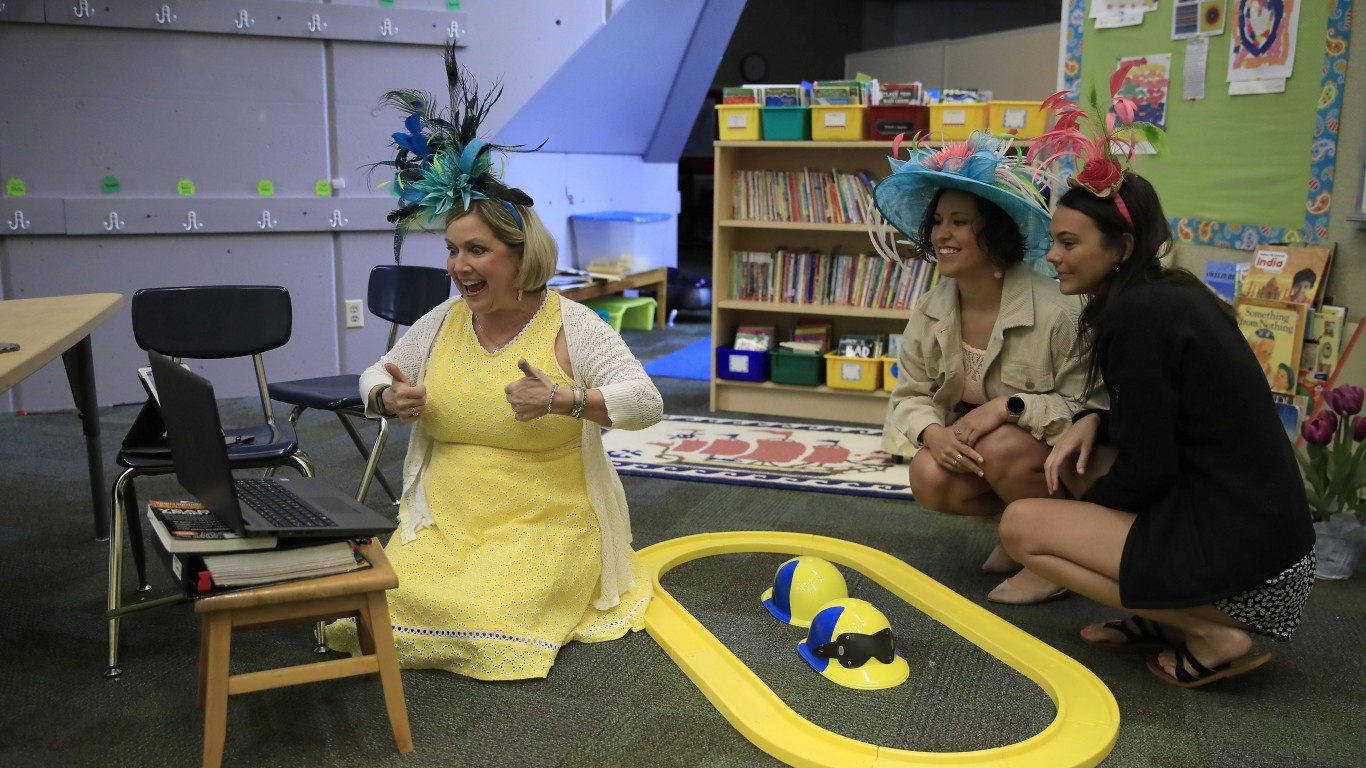
Kentucky
> Current measures taken: Middle schools and high schools remained in remote learning until Jan. 4. Several schools moved to online learning, adding makeup days at the end of the academic year.
> Health screening recommendations: Daily temperature checks
> COVID-19 cases as of Feb 8: 8,455 per 100,000 people — 24th lowest (total: 377,790)
> Change avg. daily cases, Jan 31 – Feb 7: 4.1% — 8th largest increase (from 362,890 to 377,790)
> Vaccine 2 doses administered as of Feb 8: 2,860 per 100,000 people — 25th highest (total: 127,793)
> Population: 4.5 million
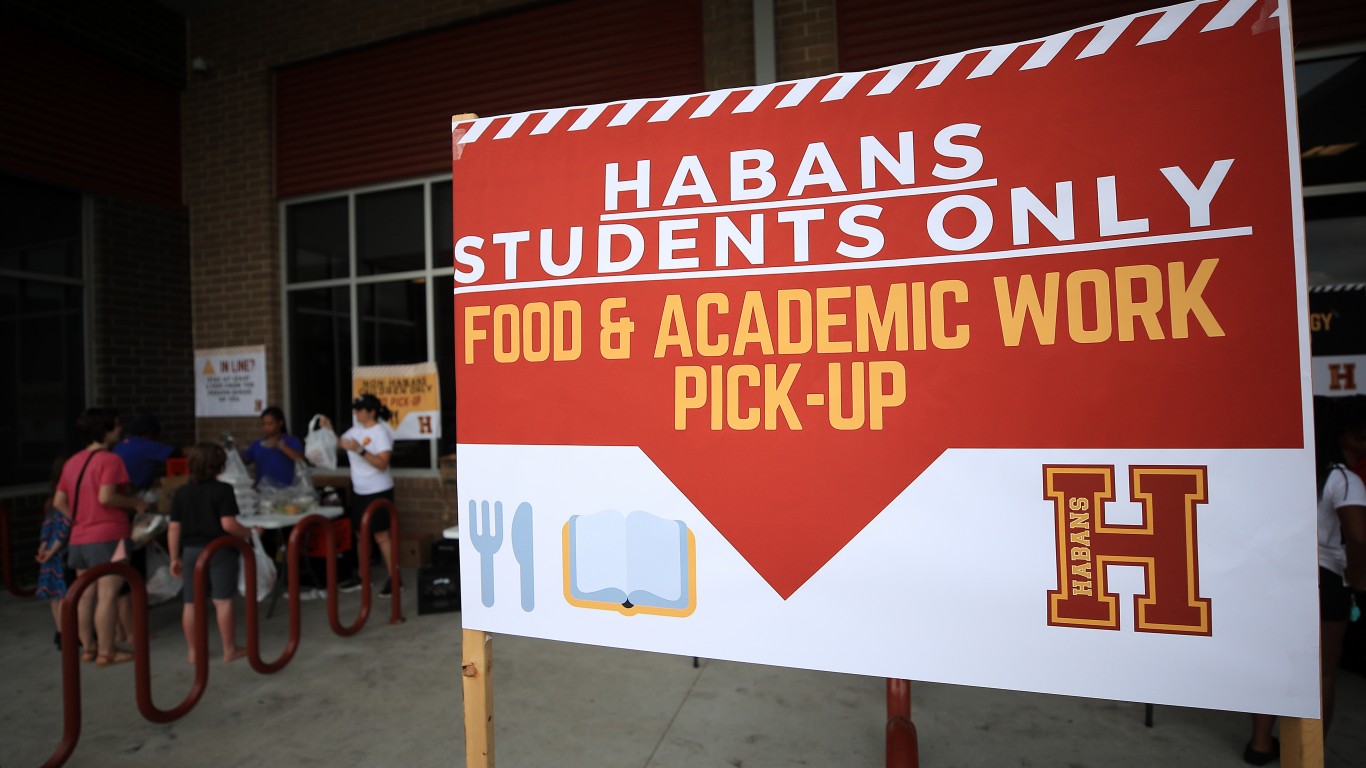
Louisiana
> Current measures taken: High school students across the state do in-person COVID-19 testing. New Orleans public schools returned to in-person learning on Jan 4. All of Louisiana is a “red” zone, meaning the highest risk of coronavirus spread.
> Health screening recommendations: Daily symptom screening and temperature checks
> COVID-19 cases as of Feb 8: 8,862 per 100,000 people — 22nd highest (total: 412,989)
> Change avg. daily cases, Jan 31 – Feb 7: 2.8% — 24th largest increase (from 400,626 to 411,812)
> Vaccine 2 doses administered as of Feb 8: 3,789 per 100,000 people — 8th highest (total: 176,580)
> Population: 4.7 million
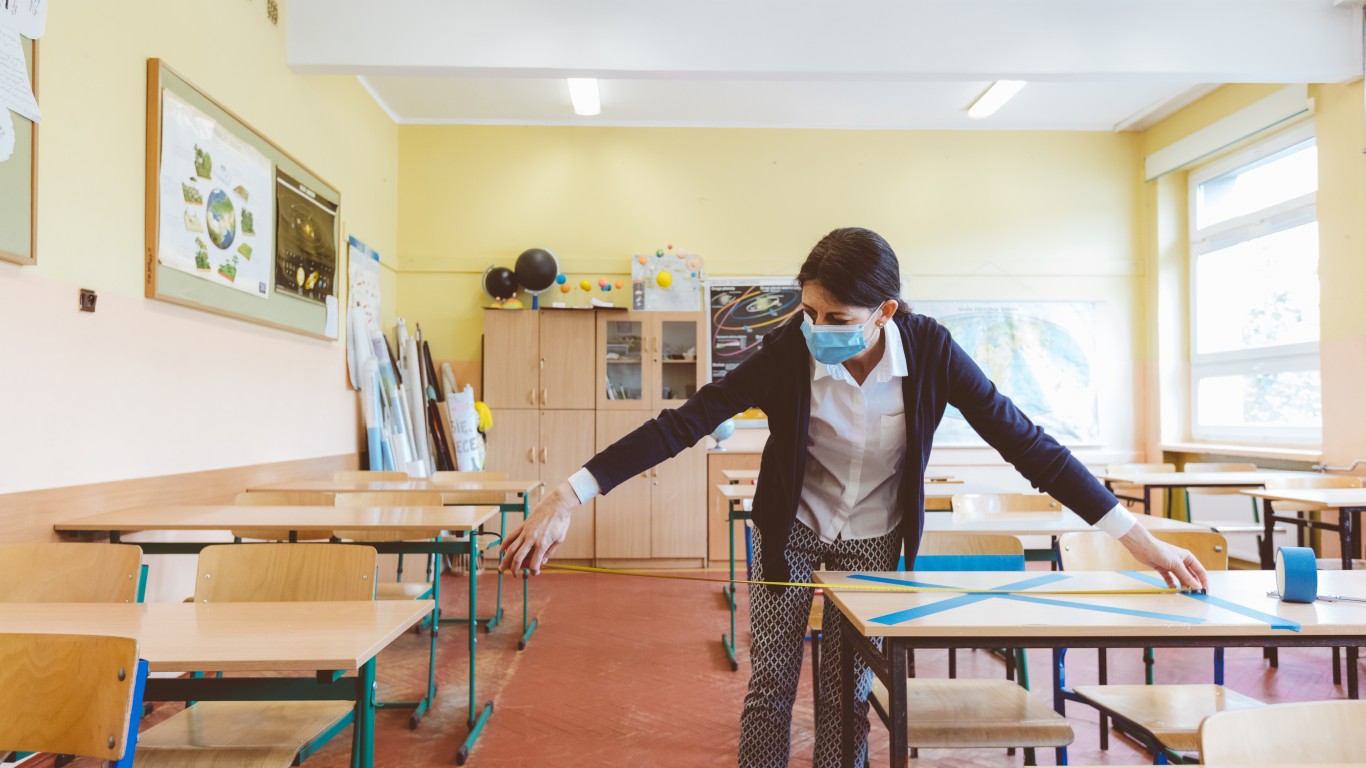
Maine
> Current measures taken: Some schools are forced to go fully remote due to staffing shortages. Four counties are in the “yellow” category of transmission, and are advised to suspend extracurricular activities. Schools in those counties are advised to consider hybrid learning.
> Health screening recommendations: Daily self-checks for students and staff
> COVID-19 cases as of Feb 8: 3,095 per 100,000 people — 3rd lowest (total: 41,419)
> Change avg. daily cases, Jan 31 – Feb 7: 4.8% — 6th largest increase (from 39,324 to 41,218)
> Vaccine 2 doses administered as of Feb 8: 3,321 per 100,000 people — 17th highest (total: 44,447)
> Population: 1.3 million
[in-text-ad-2]
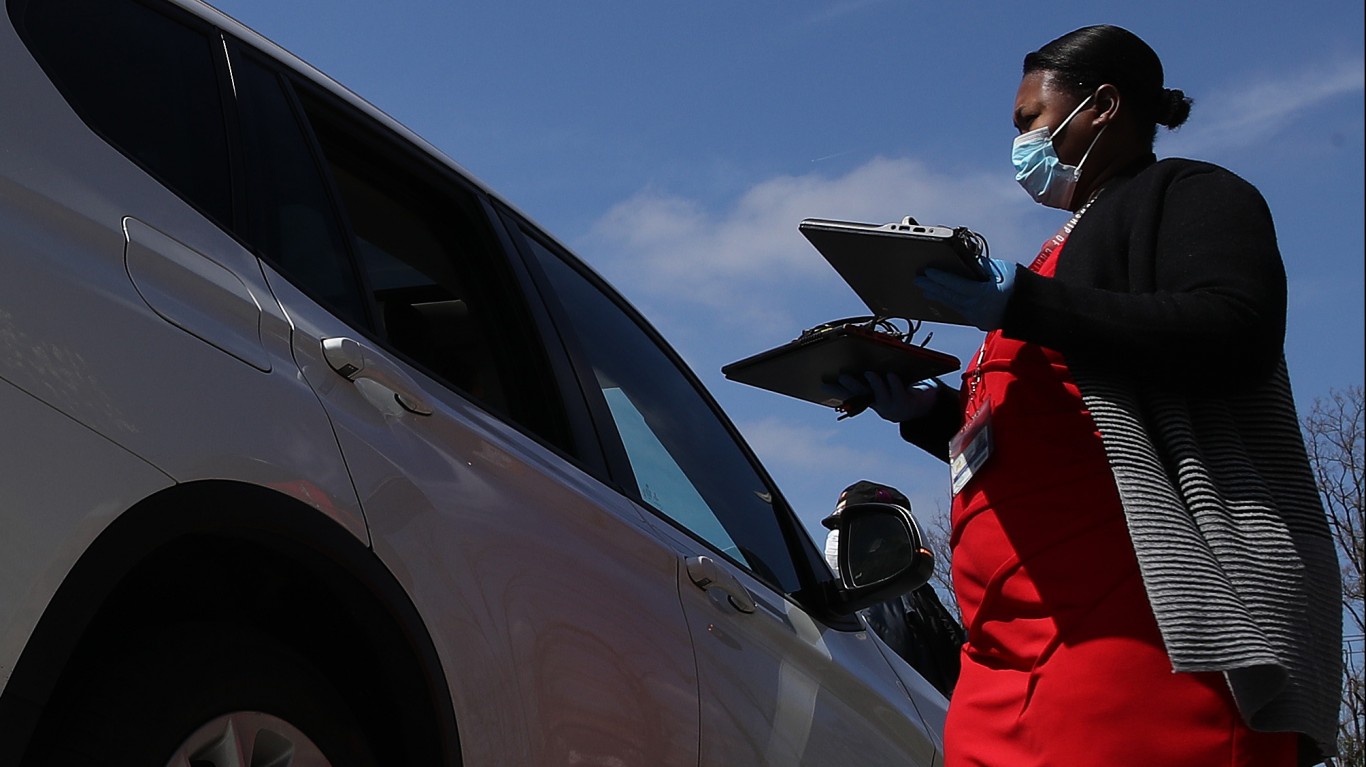
Maryland
> Current measures taken: Many schools districts are canceling plans to move to in-person instruction any time soon. Somerset County Public Schools delayed in-person learning a week, until Jan 25. Gov. Larry Hogan wants all school districts to begin hybrid learning by March 1.
> Health screening recommendations: Daily temperature checks for staff
> COVID-19 cases as of Feb 8: 6,033 per 100,000 people — 7th lowest (total: 364,553)
> Change avg. daily cases, Jan 31 – Feb 7: 2.6% — 23rd smallest increase (from 354,473 to 363,650)
> Vaccine 2 doses administered as of Feb 8: 2,496 per 100,000 people — 15th lowest (total: 150,844)
> Population: 6.0 million

Massachusetts
> Current measures taken: Some schools close again after community spread in the building. The state started a free rapid COVID-19 testing program. Teachers are now eligible for vaccinations. Worcester Public Schools will stay in virtual learning indefinitely.
> Health screening recommendations: Monitoring for symptoms, but temperature checks are not recommended
> COVID-19 cases as of Feb 8: 7,881 per 100,000 people — 18th lowest (total: 543,934)
> Change avg. daily cases, Jan 31 – Feb 7: 3.8% — 10th largest increase (from 524,025 to 543,934)
> Vaccine 2 doses administered as of Feb 8: 2,527 per 100,000 people — 16th lowest (total: 174,437)
> Population: 6.9 million
[in-text-ad]
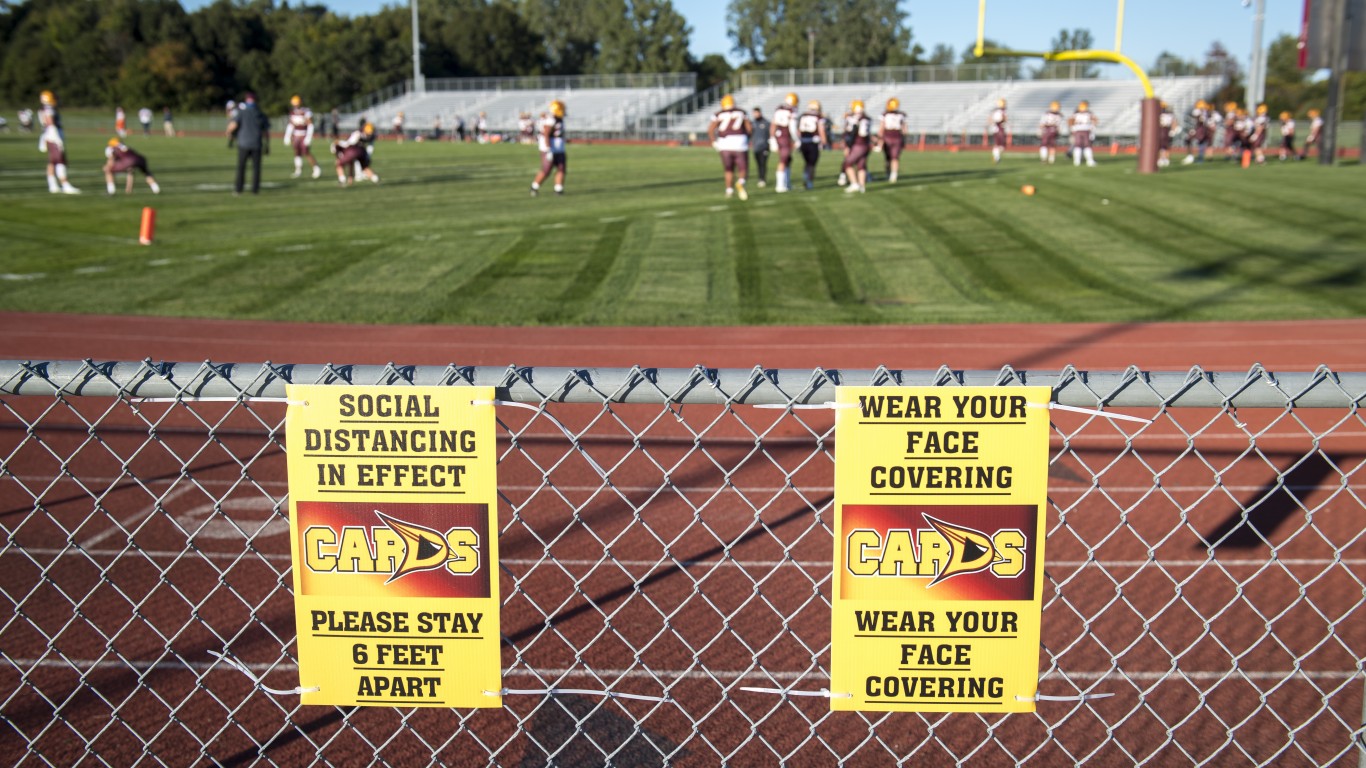
Michigan
> Current measures taken: High schools were allowed to resume in-person learning on Jan 4. Vaccination of school staff started Jan. 11. The goal is to open all public schools for in-person instruction by March 1. High school winter sports may resume by Feb 21.
> Health screening recommendations: Daily temperature checks
> COVID-19 cases as of Feb 8: 6,209 per 100,000 people — 8th lowest (total: 620,685)
> Change avg. daily cases, Jan 31 – Feb 7: 1.7% — 12th smallest increase (from 610,138 to 620,685)
> Vaccine 2 doses administered as of Feb 8: 3,289 per 100,000 people — 19th highest (total: 328,801)
> Population: 10.0 million
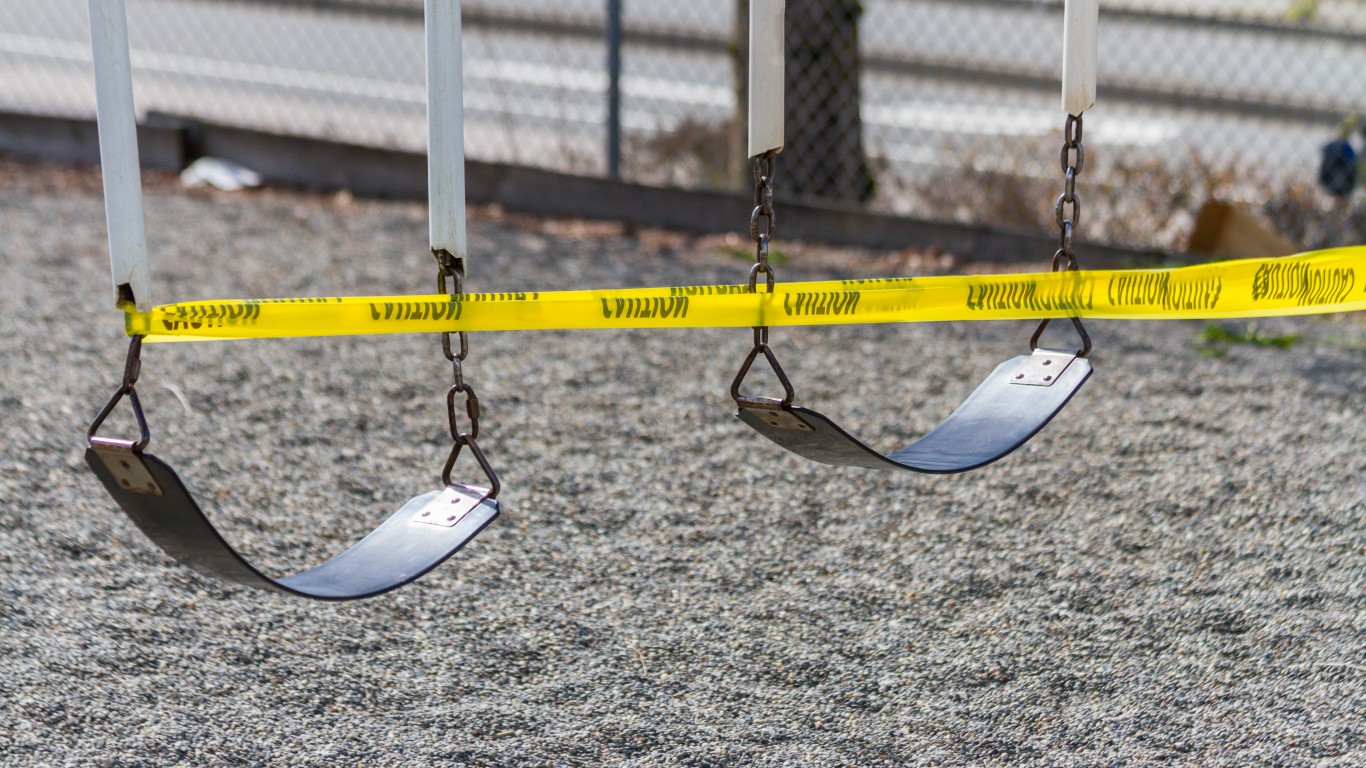
Minnesota
> Current measures taken: Most of the state’s largest school districts are in distance learning for middle and high school students. Elementary schools reopened Jan 18.
> Health screening recommendations: Daily symptom screening and temperature checks
> COVID-19 cases as of Feb 8: 8,353 per 100,000 people — 21st lowest (total: 468,682)
> Change avg. daily cases, Jan 31 – Feb 7: 1.4% — 5th smallest increase (from 461,807 to 468,118)
> Vaccine 2 doses administered as of Feb 8: 2,866 per 100,000 people — 24th highest (total: 160,794)
> Population: 5.6 million
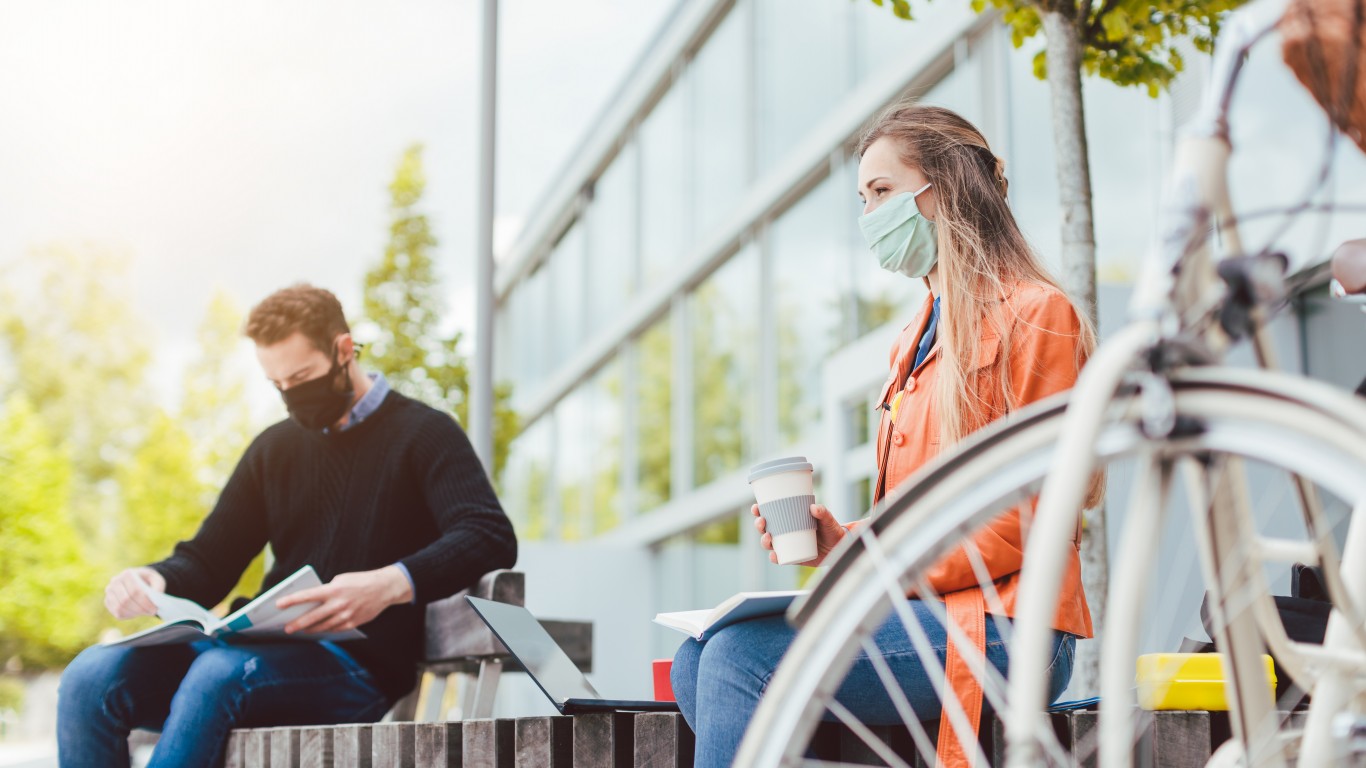
Mississippi
> Current measures taken: Of the 819 schools in 77 counties across the state reporting COVID-19 cases, there have been a total of 46 new outbreaks in the week of Jan 25-29 (compared to 38 in the week of Jan 18-22) with more than 10,000 students being quarantined. There have been 104 outbreaks in schools in January 2021 alone. Laurel School District remained on a hybrid schedule until Feb 1.
> Health screening recommendations: Daily symptom screening and temperature checks
> COVID-19 cases as of Feb 8: 9,453 per 100,000 people — 15th highest (total: 282,313)
> Change avg. daily cases, Jan 31 – Feb 7: 2.4% — 21st smallest increase (from 275,001 to 281,678)
> Vaccine 2 doses administered as of Feb 8: 1,986 per 100,000 people — 2nd lowest (total: 59,325)
> Population: 3.0 million
[in-text-ad-2]
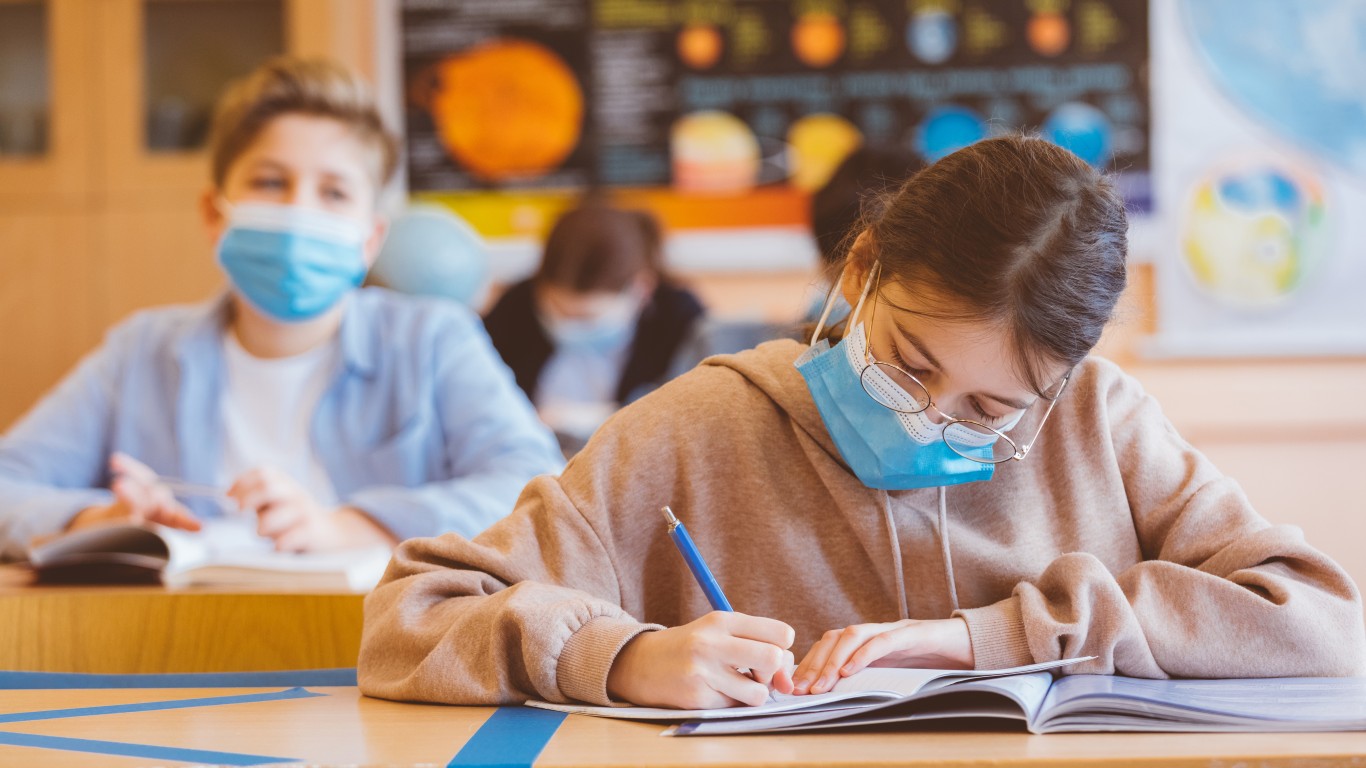
Missouri
> Current measures taken: New mandates say that if people wear masks correctly and show no symptoms, they don’t have to quarantine for 14 days if exposed.
> Health screening recommendations: Daily symptom screening
> COVID-19 cases as of Feb 8: 7,617 per 100,000 people — 16th lowest (total: 466,664)
> Change avg. daily cases, Jan 31 – Feb 7: 1.6% — 9th smallest increase (from 458,819 to 466,217)
> Vaccine 2 doses administered as of Feb 8: 2,385 per 100,000 people — 12th lowest (total: 146,137)
> Population: 6.1 million
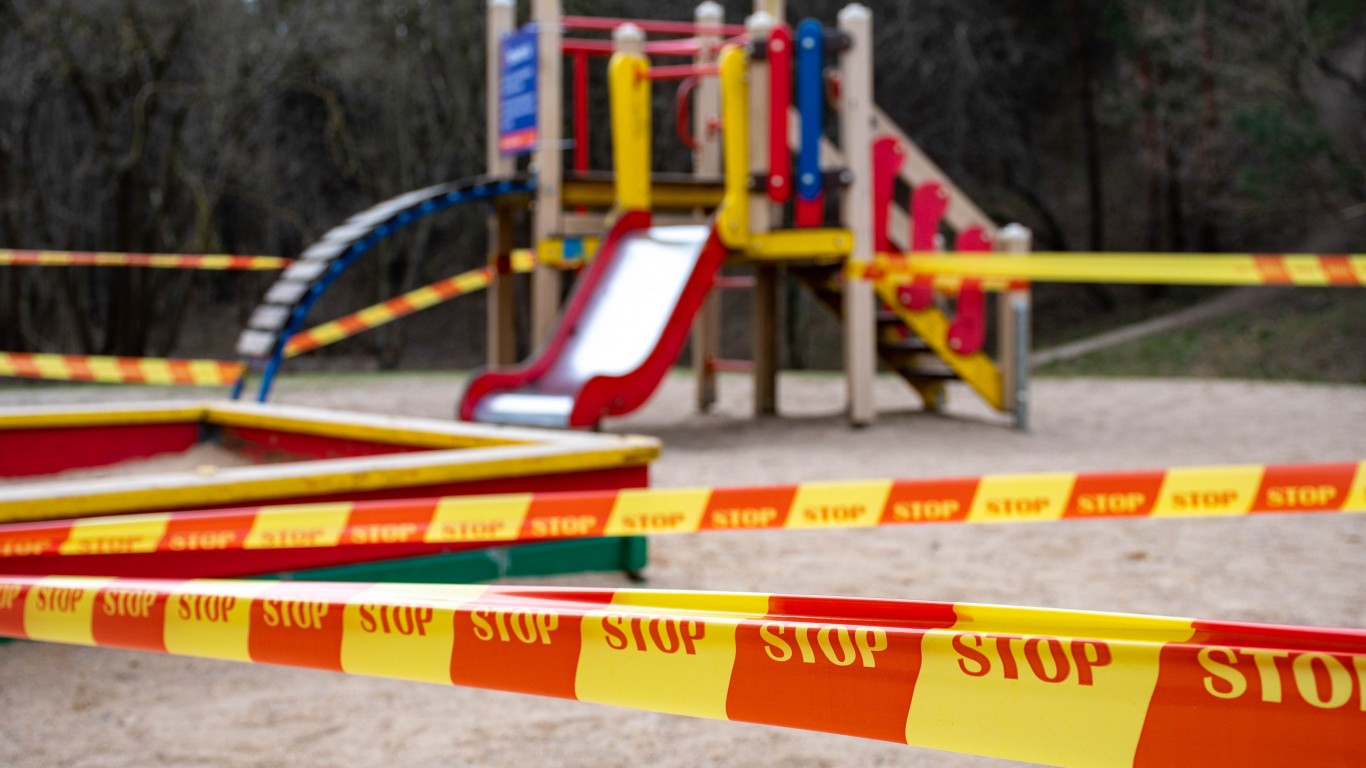
Montana
> Current measures taken: More parents pull out their children from schools and sign them up for homeschooling. The Montana Board of Public Education voted to request permission from the U.S. Department of Education to waive standardized testing requirements.
> Health screening recommendations: Temperature checks for visitors
> COVID-19 cases as of Feb 8: 9,029 per 100,000 people — 20th highest (total: 95,914)
> Change avg. daily cases, Jan 31 – Feb 7: 2.0% — 13th smallest increase (from 93,949 to 95,790)
> Vaccine 2 doses administered as of Feb 8: 3,445 per 100,000 people — 13th highest (total: 36,596)
> Population: 1.1 million
[in-text-ad]
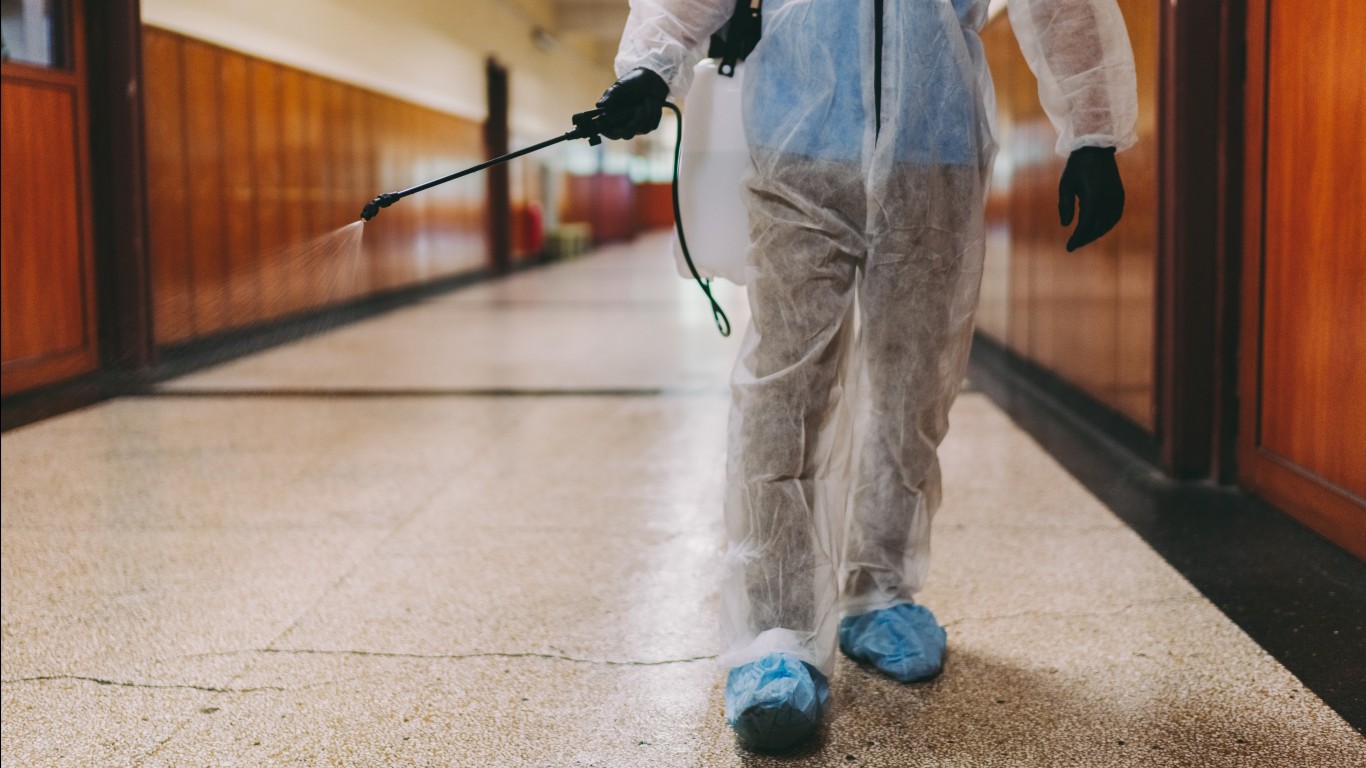
Nebraska
> Current measures taken: Elementary students returned for in-person instruction on Feb. 2, high schoolers will on Feb. 17. Nebraska teachers were supposed to be able to receive the COVID vaccine in January or early February, but the start of that phase has been delayed until possibly March or even April.
> Health screening recommendations: For visitors to wash hands before entering the school as well as students self-screen for symptoms
> COVID-19 cases as of Feb 8: 10,047 per 100,000 people — 10th highest (total: 193,826)
> Change avg. daily cases, Jan 31 – Feb 7: 1.6% — 8th smallest increase (from 190,713 to 193,722)
> Vaccine 2 doses administered as of Feb 8: 3,506 per 100,000 people — 12th highest (total: 67,636)
> Population: 1.9 million
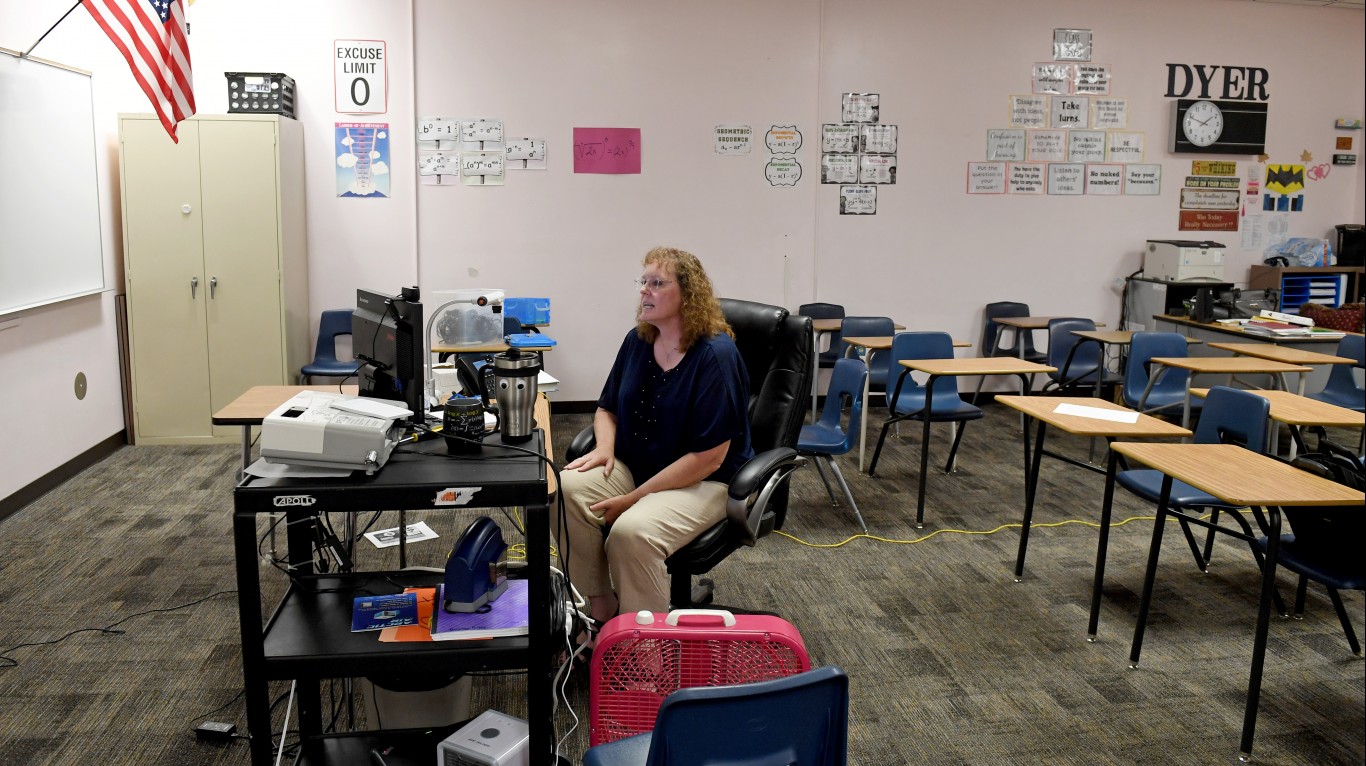
Nevada
> Current measures taken: Schools started testing symptomatic students and staff with an antigen test. Some districts have been allowed to bypass regulations to hire substitute teachers.
> Health screening recommendations: Daily symptom screening and temperature checks as well as post signs about proper hand-washing and other ways to stop the virus
> COVID-19 cases as of Feb 8: 9,379 per 100,000 people — 17th highest (total: 284,590)
> Change avg. daily cases, Jan 31 – Feb 7: 2.1% — 15th smallest increase (from 278,308 to 284,042)
> Vaccine 2 doses administered as of Feb 8: 2,200 per 100,000 people — 6th lowest (total: 66,755)
> Population: 3.0 million
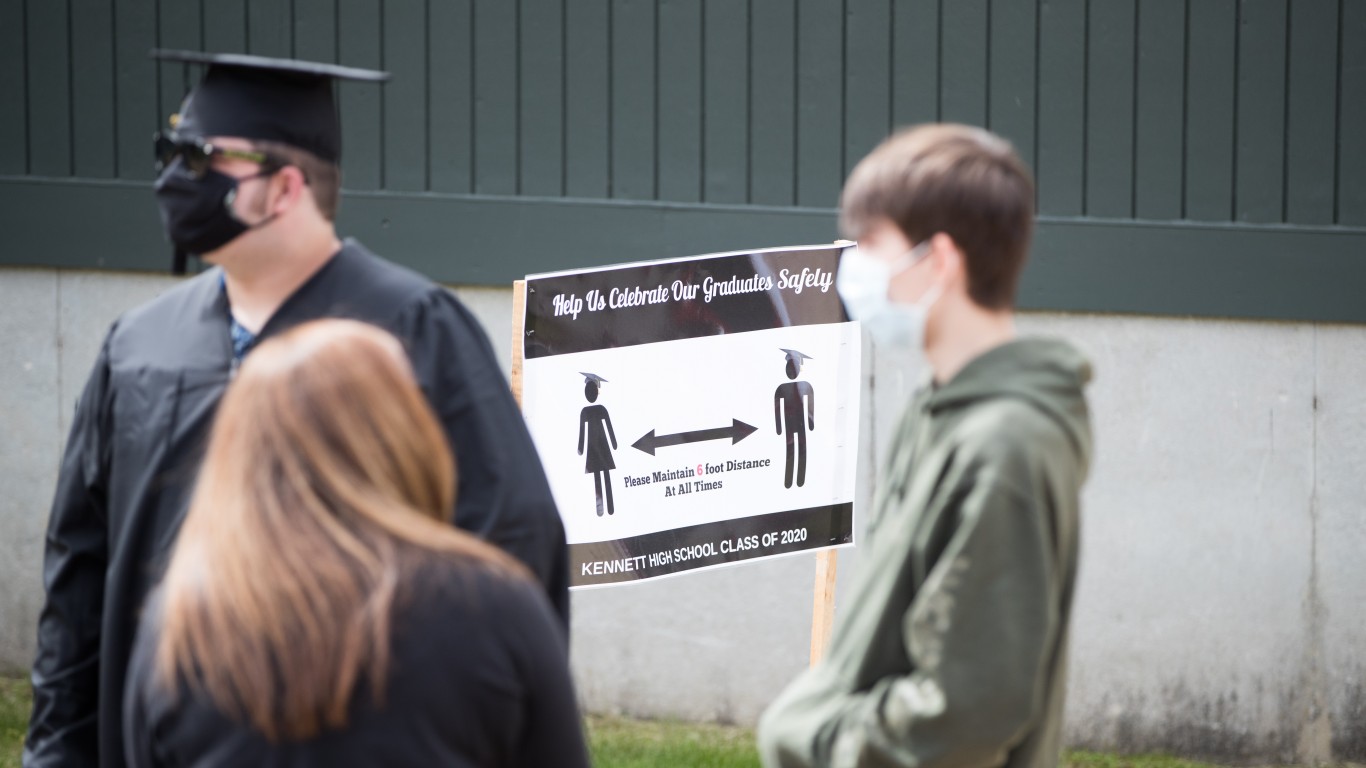
New Hampshire
> Current measures taken: Some schools are forced to move online due to staffing shortages as teachers and staff have to quarantine. K-12 staff and child care workers won’t be eligible for vaccinations until March.
> Health screening recommendations: Daily symptom screenings for staff and students
> COVID-19 cases as of Feb 8: 5,041 per 100,000 people — 6th lowest (total: 68,379)
> Change avg. daily cases, Jan 31 – Feb 7: 3.6% — 14th largest increase (from 65,695 to 68,061)
> Vaccine 2 doses administered as of Feb 8: 3,396 per 100,000 people — 14th highest (total: 46,071)
> Population: 1.4 million
[in-text-ad-2]
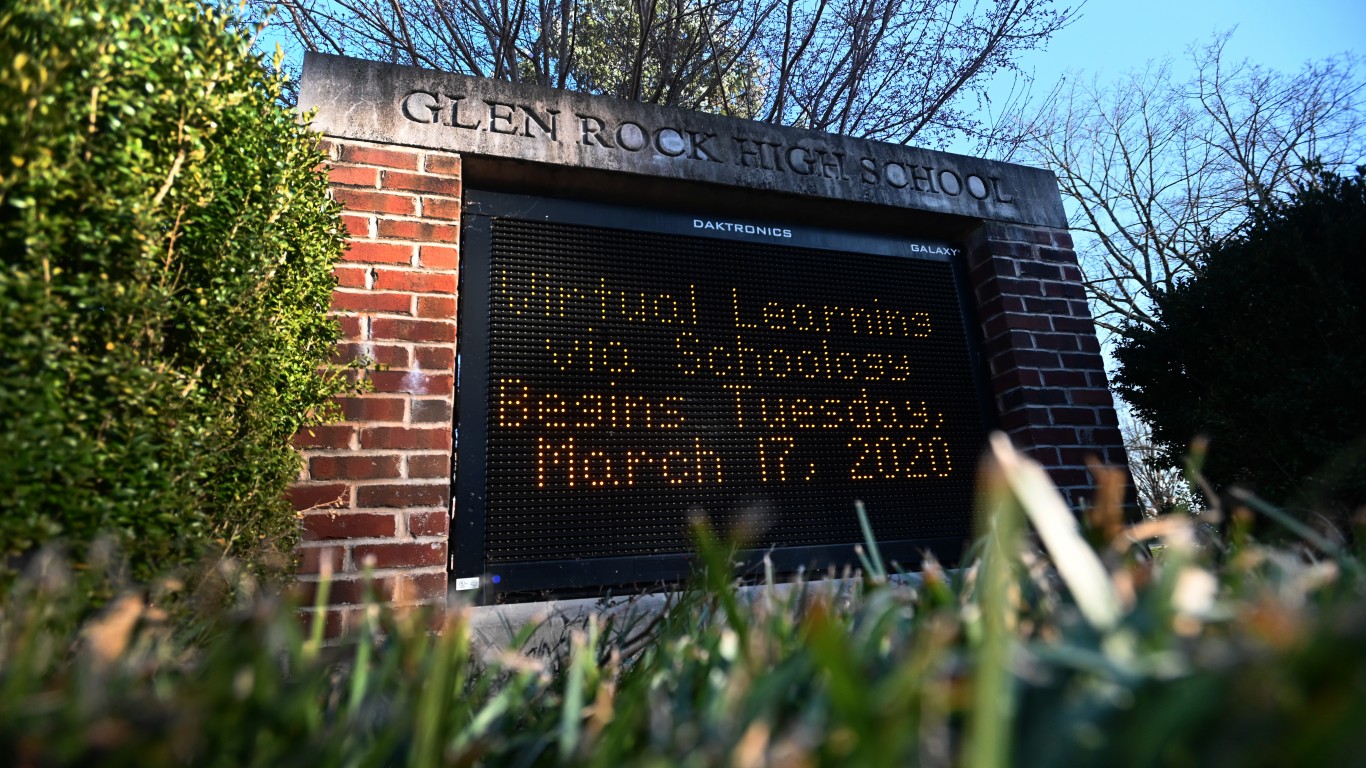
New Jersey
> Current measures taken: Graduation assessment test requirement and student growth objectives have been removed. Hundreds of schools opened remotely after the winter break, dozens opened by providing in-person instruction.
> Health screening recommendations: Daily symptom screening
> COVID-19 cases as of Feb 8: 8,135 per 100,000 people — 20th lowest (total: 724,679)
> Change avg. daily cases, Jan 31 – Feb 7: 3.6% — 13th largest increase (from 696,782 to 722,119)
> Vaccine 2 doses administered as of Feb 8: 2,486 per 100,000 people — 14th lowest (total: 221,465)
> Population: 8.9 million
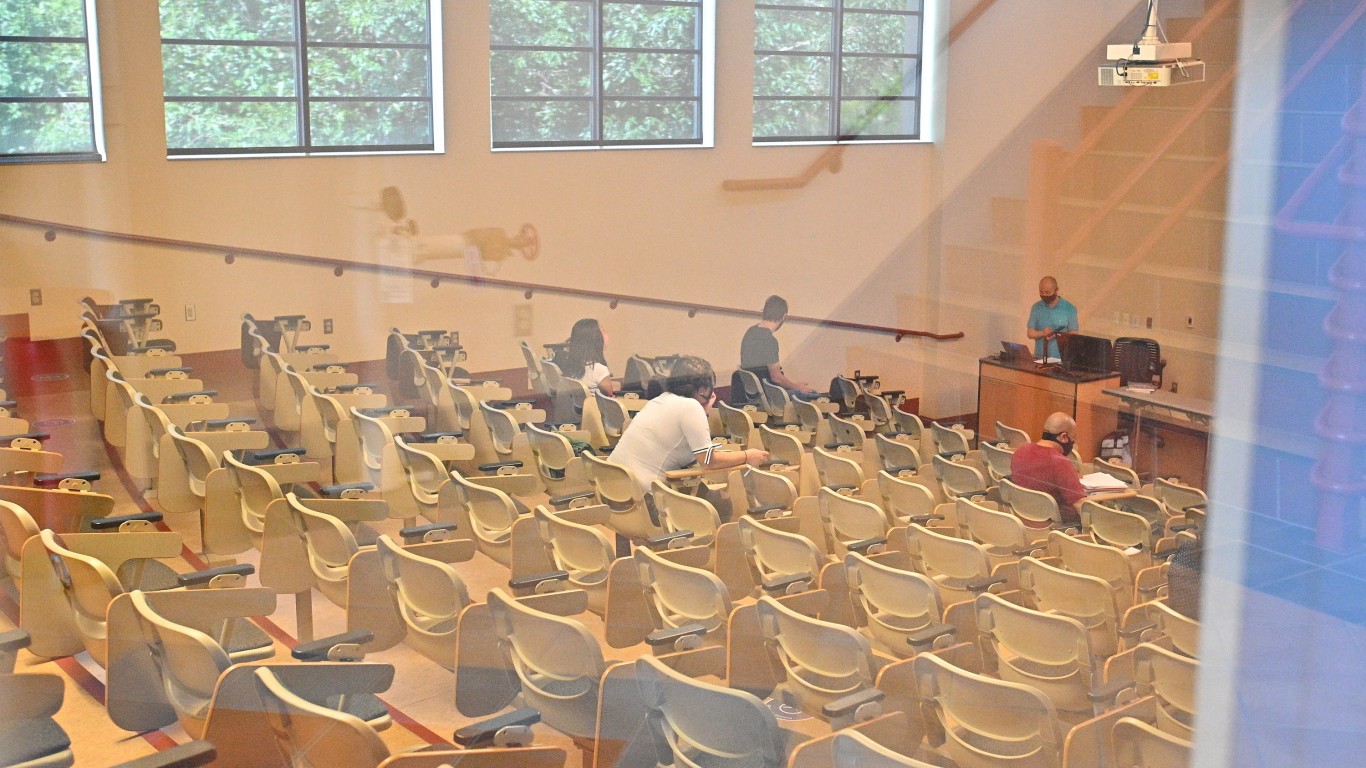
New Mexico
> Current measures taken: Rio Rancho Public Schools moved to full-time online instruction until Jan 18. At least 31 public schools were on the COVID-19 Watchlist in the week ending Jan 29, meaning they had at least two Rapid Responses within a 14-day period.
> Health screening recommendations: Daily temperature checks
> COVID-19 cases as of Feb 8: 8,473 per 100,000 people — 25th highest (total: 177,556)
> Change avg. daily cases, Jan 31 – Feb 7: 2.0% — 14th smallest increase (from 174,064 to 177,556)
> Vaccine 2 doses administered as of Feb 8: 4,196 per 100,000 people — 6th highest (total: 87,916)
> Population: 2.1 million
[in-text-ad]
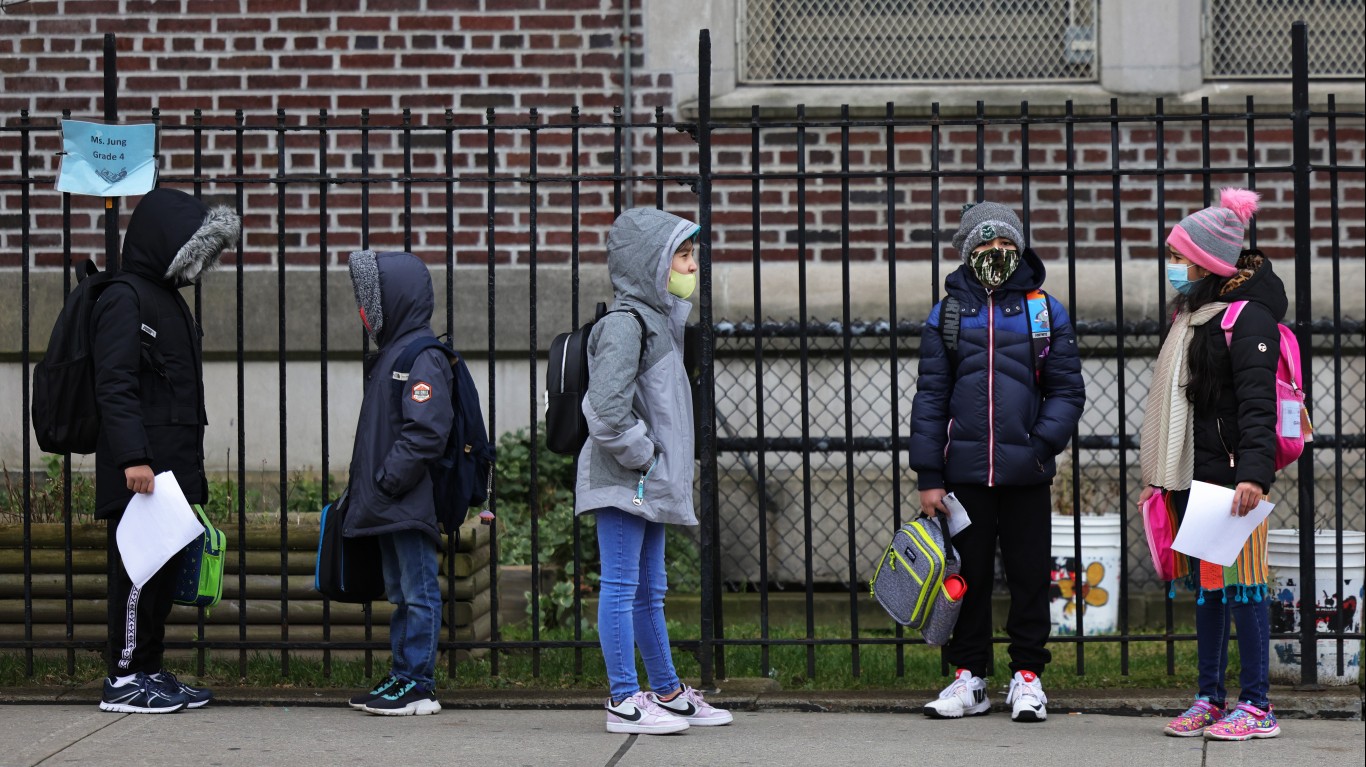
New York
> Current measures taken: Across the state, if schools show positive rates below 9%, they can remain open. Elementary schools in NYC can open for students whose parents agree to weekly tests. Hundreds of schools are fully or partially closed. Closures were cut to 10 days, instead of 14, as per CDC guidelines. More than 300 NYC schools are closed for in-person instruction due to COVID-19 cases.
> Health screening recommendations: Daily temperature checks for all
> COVID-19 cases as of Feb 8: 7,569 per 100,000 people — 15th lowest (total: 1,479,220)
> Change avg. daily cases, Jan 31 – Feb 7: 4.3% — 7th largest increase (from 1,410,656 to 1,470,772)
> Vaccine 2 doses administered as of Feb 8: 2,836 per 100,000 people — 25th lowest (total: 554,262)
> Population: 19.5 million
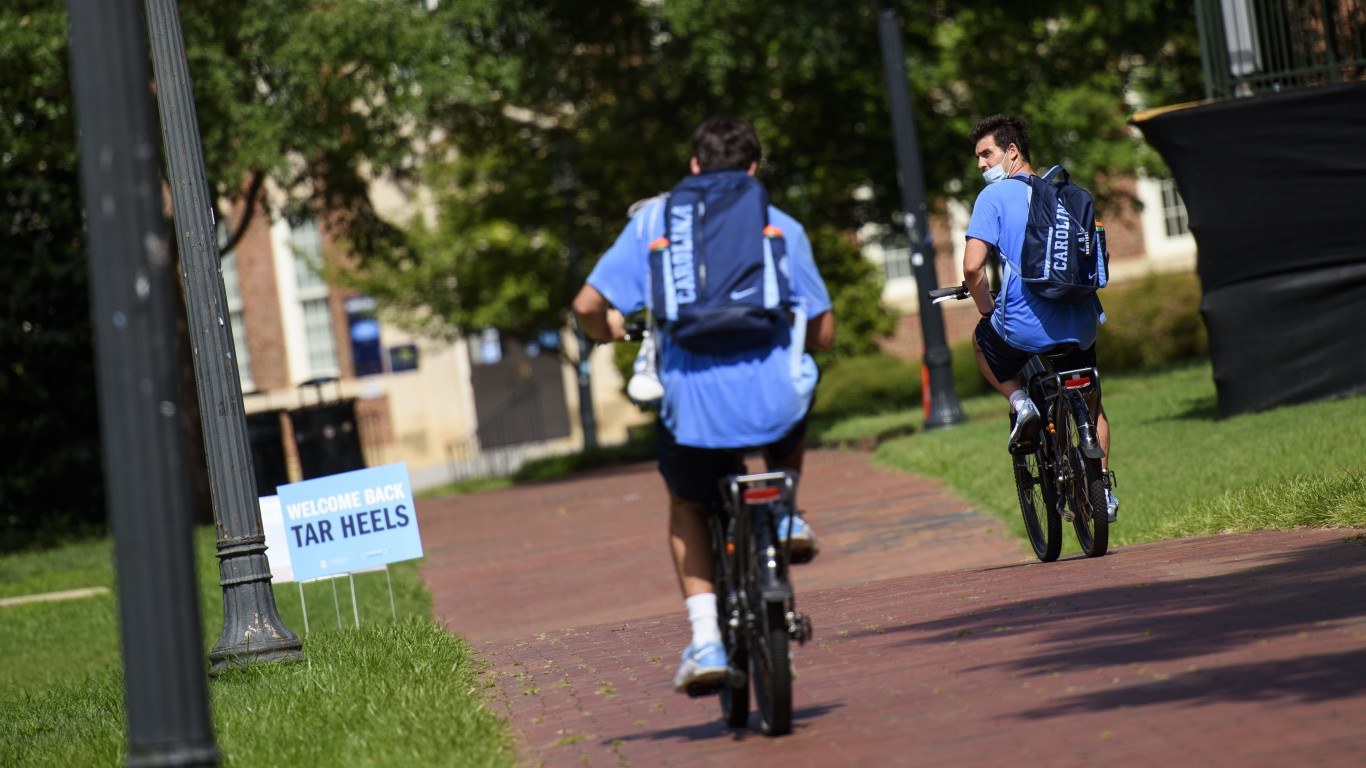
North Carolina
> Current measures taken: The Johnston County school board voted 5-2 to suspend in-person classes. Charlotte-Mecklenburg Schools moved to online learning until Feb 12.
> Health screening recommendations: Daily temperature checks
> COVID-19 cases as of Feb 8: 7,697 per 100,000 people — 17th lowest (total: 799,279)
> Change avg. daily cases, Jan 31 – Feb 7: 5.1% — 4th largest increase (from 757,526 to 796,195)
> Vaccine 2 doses administered as of Feb 8: 2,636 per 100,000 people — 21st lowest (total: 273,763)
> Population: 10.4 million
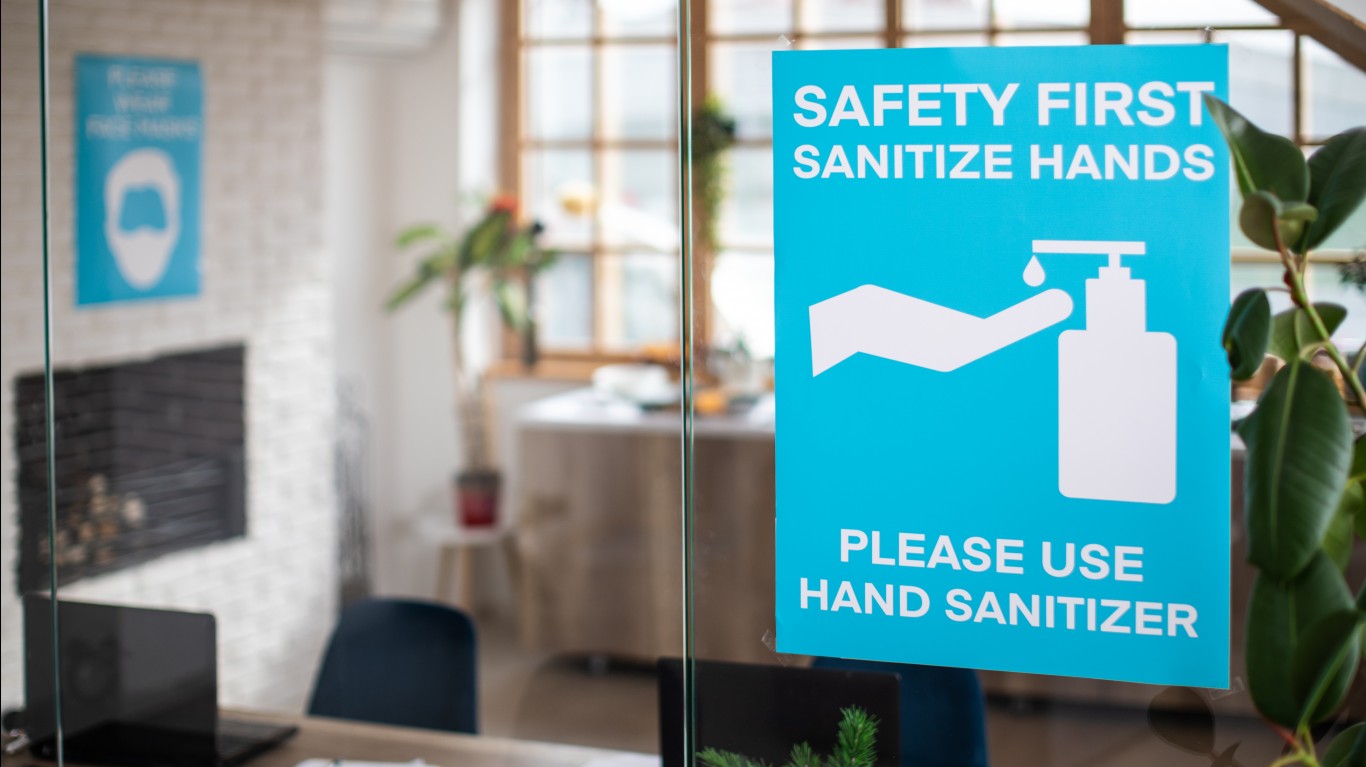
North Dakota
> Current measures taken: The state started free rapid testing for K-12 teachers, staff and administrators.
> Health screening recommendations: Testing for COVID-19 based on risk level
> COVID-19 cases as of Feb 8: 12,918 per 100,000 people — the highest (total: 98,184)
> Change avg. daily cases, Jan 31 – Feb 7: 0.5% — 2nd smallest increase (from 97,630 to 98,155)
> Vaccine 2 doses administered as of Feb 8: 5,054 per 100,000 people — 3rd highest (total: 38,417)
> Population: 760,000
[in-text-ad-2]
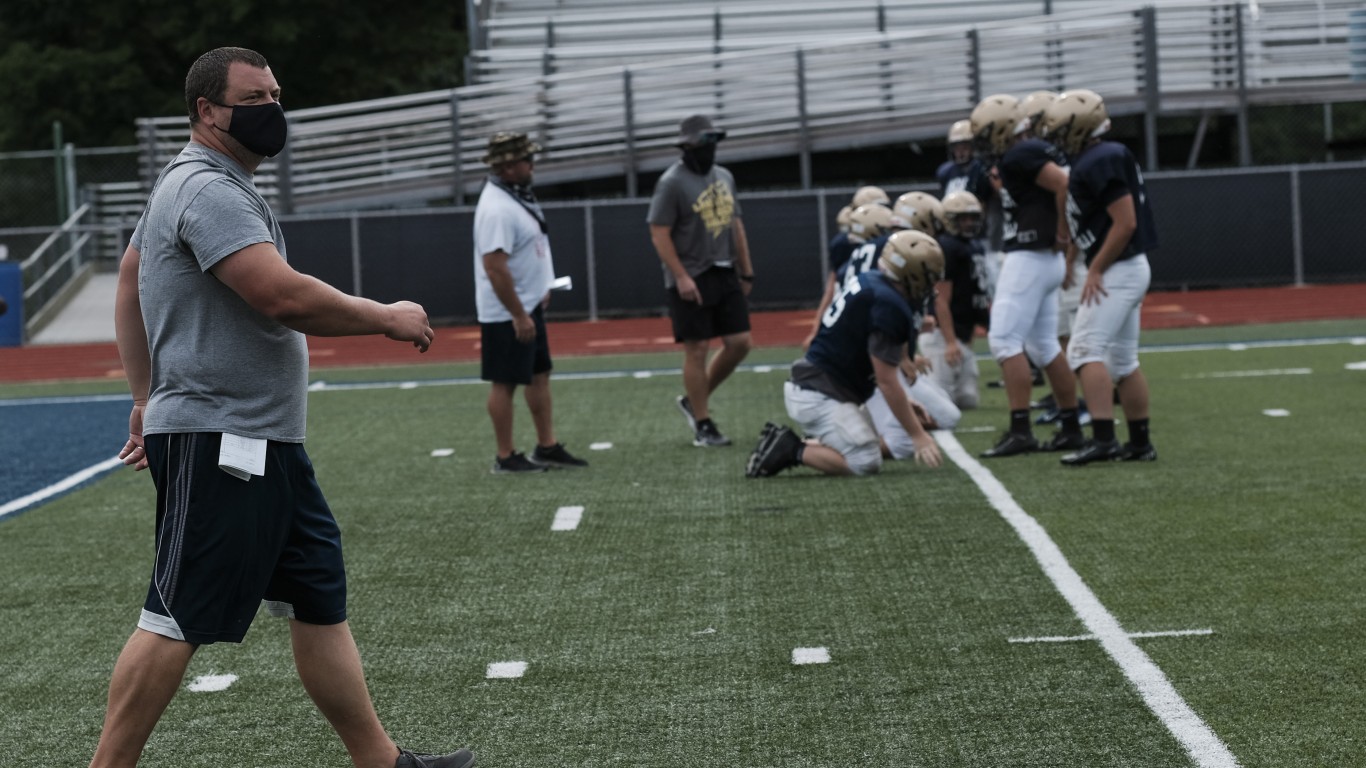
Ohio
> Current measures taken: Ohio students who are exposed to COVID-19 are no longer asked to quarantine, if mask and distancing protocols are followed. Most Ohio schools plan to return to in-person learning by March 1. Efforts to vaccinate schools staff started Feb 1.
> Health screening recommendations: Daily symptom screening
> COVID-19 cases as of Feb 8: 7,889 per 100,000 people — 19th lowest (total: 922,143)
> Change avg. daily cases, Jan 31 – Feb 7: 2.7% — 24th smallest increase (from 895,792 to 920,217)
> Vaccine 2 doses administered as of Feb 8: 2,618 per 100,000 people — 20th lowest (total: 306,072)
> Population: 11.7 million
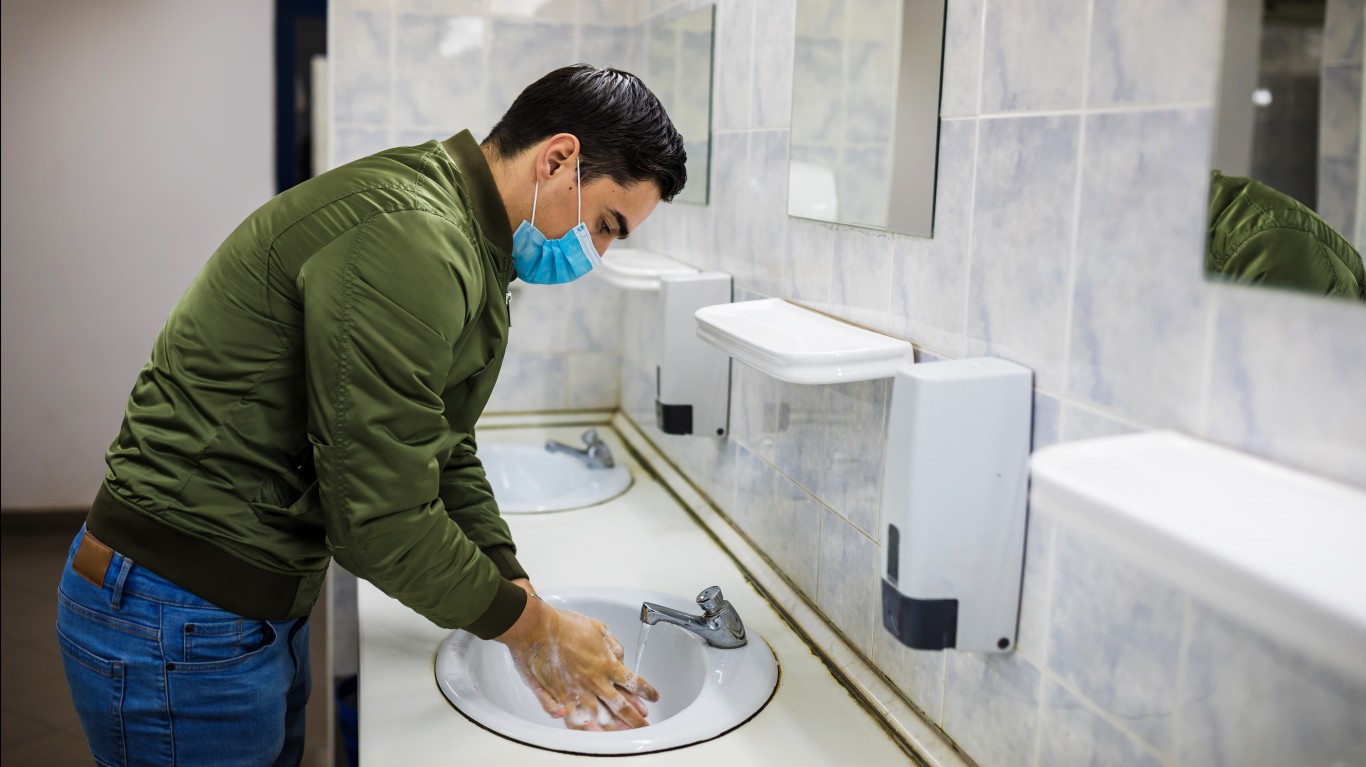
Oklahoma
> Current measures taken: Use of masks is enforced. Unless students or staff are showing symptoms, they don’t have to quarantine. Teachers are now eligible to get the COVID-19 vaccine.
> Health screening recommendations: Daily temperature checks at home
> COVID-19 cases as of Feb 8: 10,271 per 100,000 people — 8th highest (total: 404,994)
> Change avg. daily cases, Jan 31 – Feb 7: 3.7% — 12th largest increase (from 389,472 to 403,954)
> Vaccine 2 doses administered as of Feb 8: 3,830 per 100,000 people — 7th highest (total: 151,019)
> Population: 3.9 million
[in-text-ad]
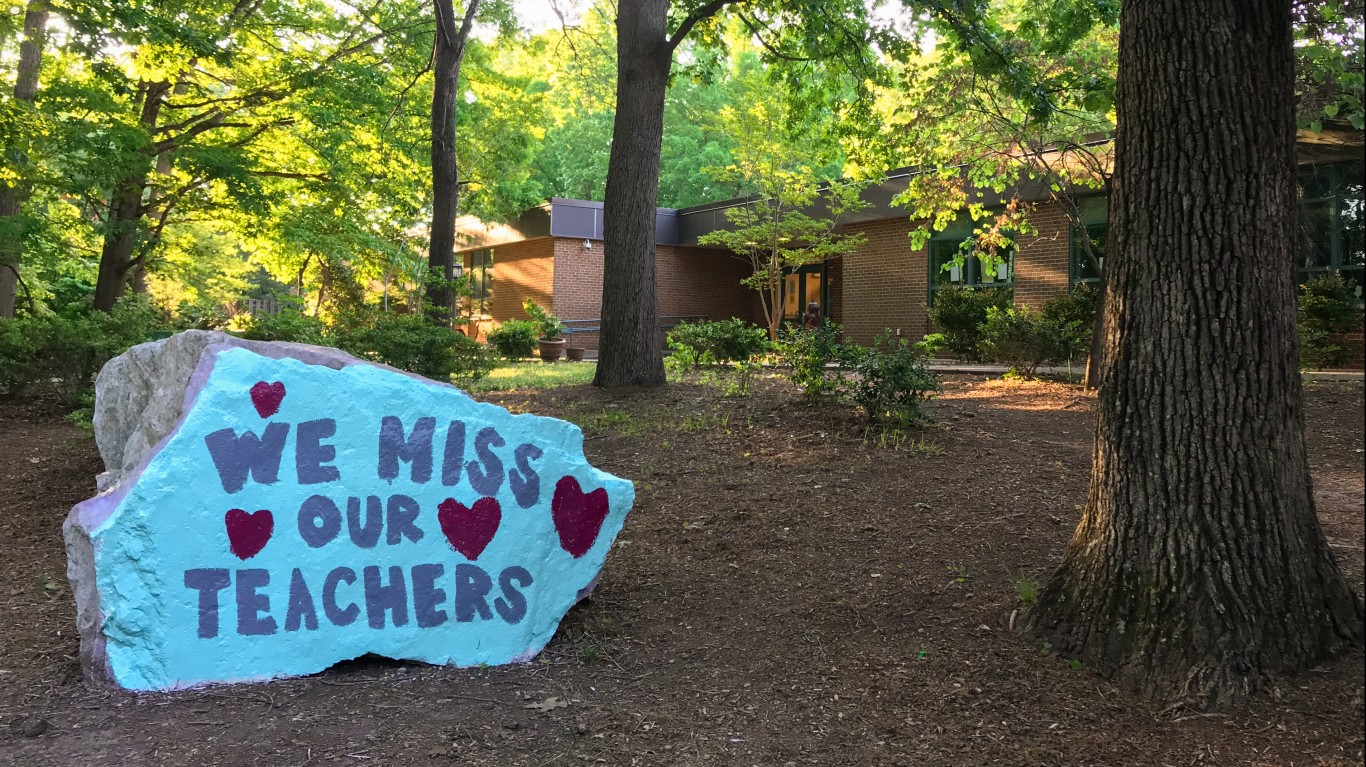
Oregon
> Current measures taken: Schools are advised to reopen for elementary on-site and hybrid transition when there are 350 COVID-19 cases per 100,000 in a county, up from 200 or below. Vale High School is closed until Feb. 11 due to COVID-19 cases.
> Health screening recommendations: Daily symptom screening and temperature checks
> COVID-19 cases as of Feb 8: 3,487 per 100,000 people — 4th lowest (total: 146,138)
> Change avg. daily cases, Jan 31 – Feb 7: 3.3% — 16th largest increase (from 142,416 to 147,122)
> Vaccine 2 doses administered as of Feb 8: 3,334 per 100,000 people — 16th highest (total: 139,700)
> Population: 4.2 million
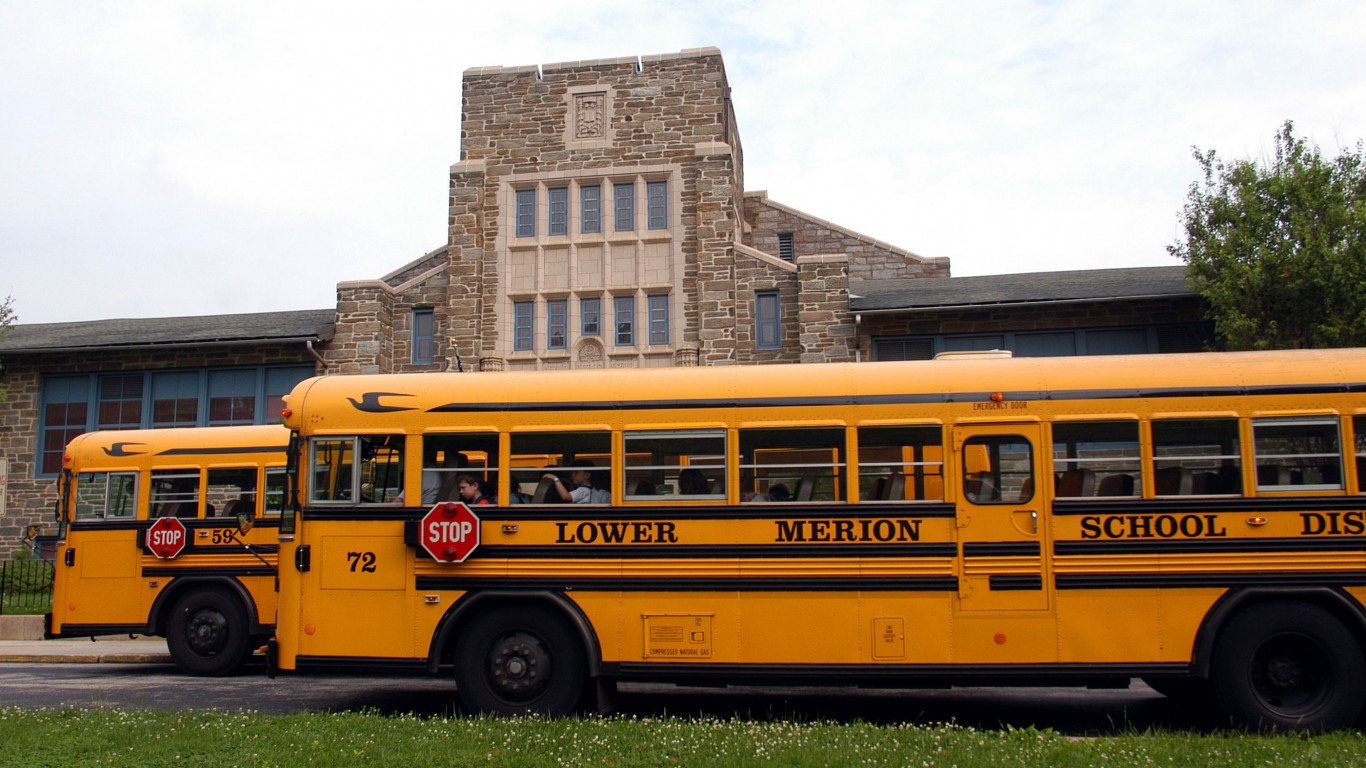
Pennsylvania
> Current measures taken: Schools must close if they reach a certain number of COVID-19 cases. Nearly all districts have submitted forms attesting that they are following safety protocols, a requirement to stay open.
> Health screening recommendations: Daily symptom screening
> COVID-19 cases as of Feb 8: 6,796 per 100,000 people — 10th lowest (total: 870,321)
> Change avg. daily cases, Jan 31 – Feb 7: 3.2% — 19th largest increase (from 843,224 to 870,321)
> Vaccine 2 doses administered as of Feb 8: 2,568 per 100,000 people — 17th lowest (total: 328,907)
> Population: 12.8 million
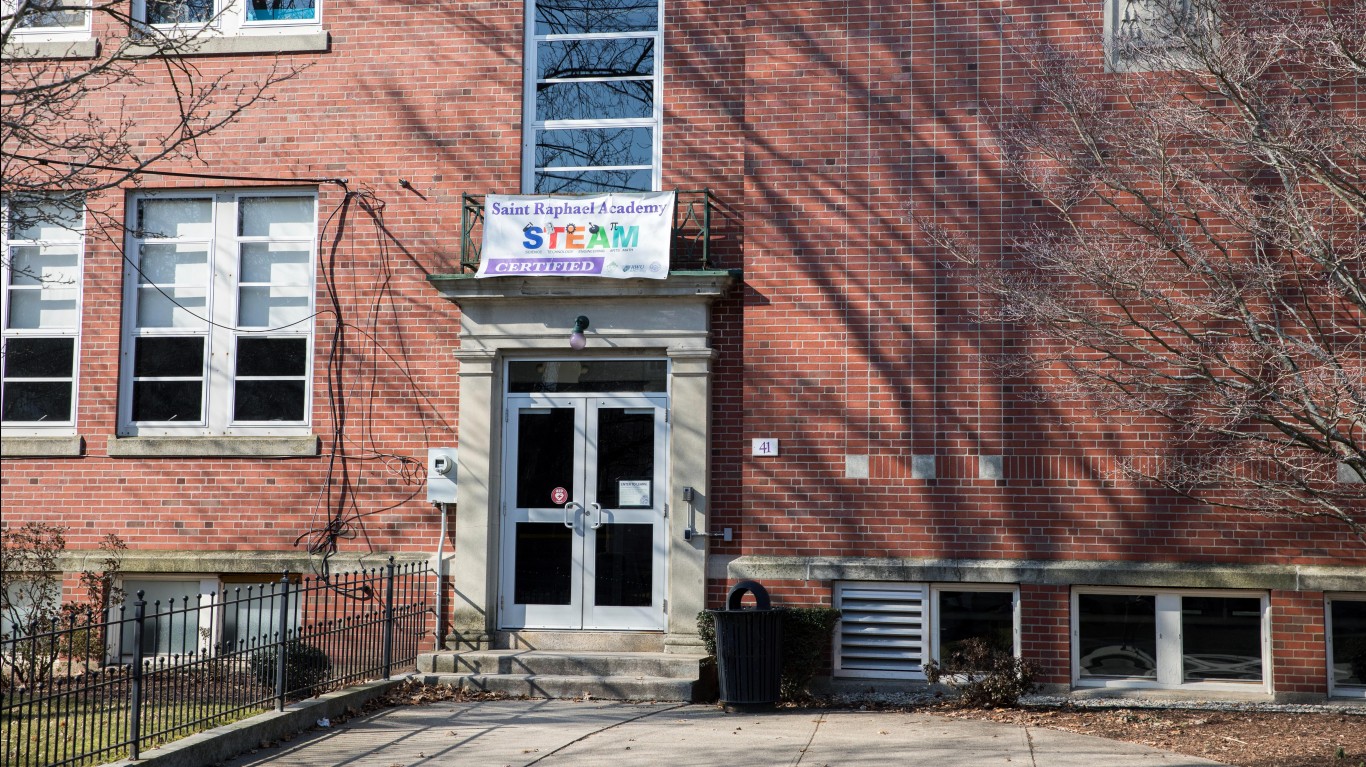
Rhode Island
> Current measures taken: Most high school students are participating in remote learning, while elementary and middle schools students continue in-person learning. The state has set up 12 dedicated testing sites for students and teachers.
> Health screening recommendations: At-home or on-site symptom screening as well as temperature checks
> COVID-19 cases as of Feb 8: 11,265 per 100,000 people — 2nd highest (total: 119,104)
> Change avg. daily cases, Jan 31 – Feb 7: 3.0% — 21st largest increase (from 114,438 to 117,891)
> Vaccine 2 doses administered as of Feb 8: 3,348 per 100,000 people — 15th highest (total: 35,402)
> Population: 1.1 million
[in-text-ad-2]
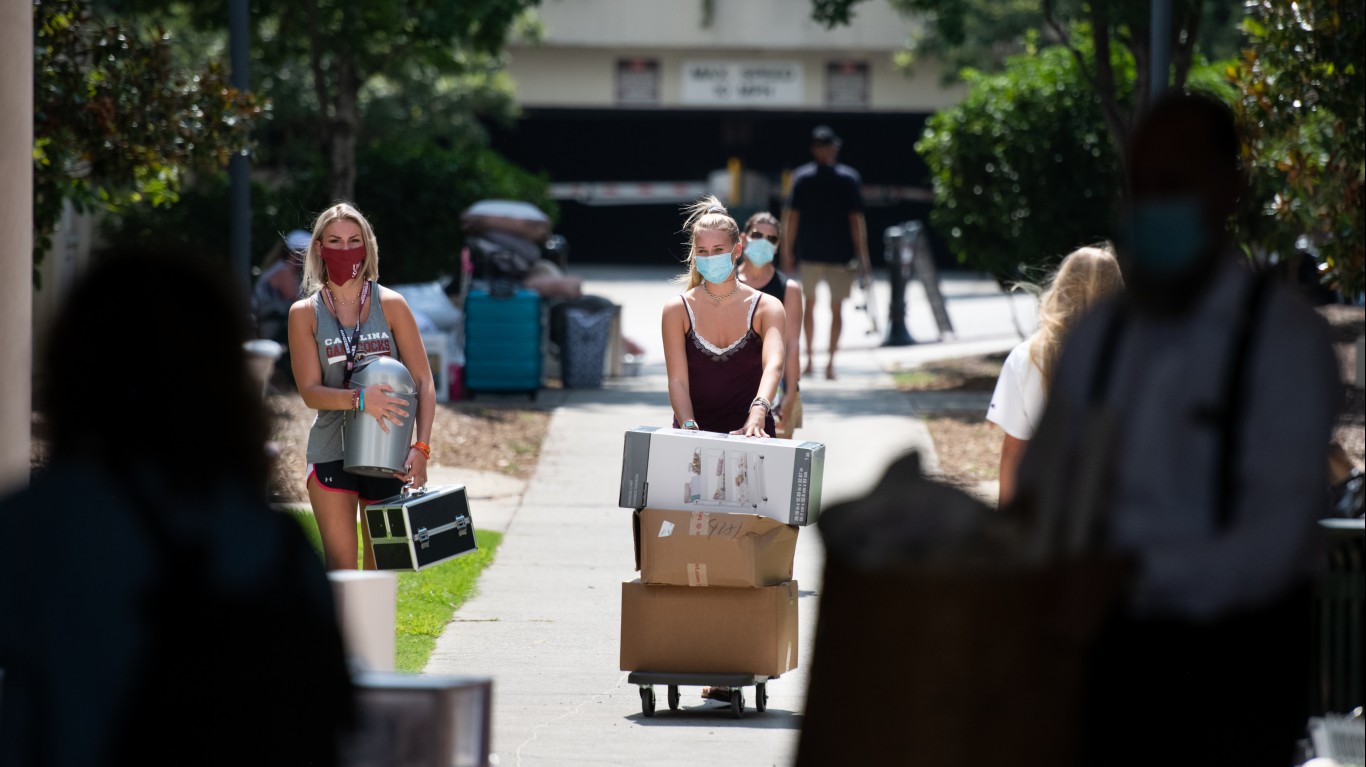
South Carolina
> Current measures taken: Public schools across the state started testing for COVID-19 for free in an attempt to help keep classrooms open.
> Health screening recommendations: Each school to come up with its own safety measures
> COVID-19 cases as of Feb 8: 9,213 per 100,000 people — 18th highest (total: 468,403)
> Change avg. daily cases, Jan 31 – Feb 7: 5.2% — 3rd largest increase (from 443,386 to 466,373)
> Vaccine 2 doses administered as of Feb 8: 2,345 per 100,000 people — 9th lowest (total: 119,206)
> Population: 5.1 million
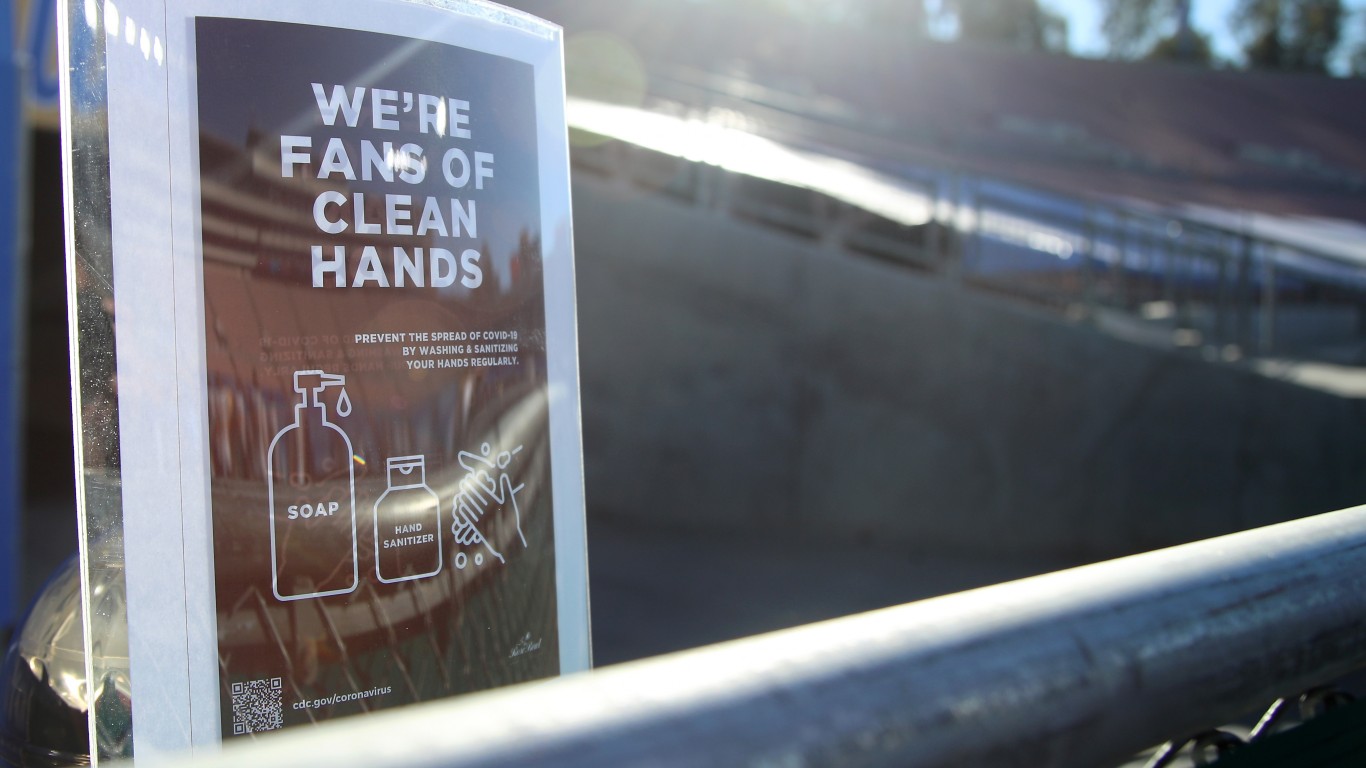
South Dakota
> Current measures taken: Many school districts have implemented mask mandates. Teachers will be eligible to receive the COVID-19 vaccine in the next phase of distribution. No start date for that has been set yet.
> Health screening recommendations: Daily symptom screening and temperature checks
> COVID-19 cases as of Feb 8: 11,046 per 100,000 people — 4th highest (total: 97,449)
> Change avg. daily cases, Jan 31 – Feb 7: 0.7% — 3rd smallest increase (from 96,683 to 97,406)
> Vaccine 2 doses administered as of Feb 8: 4,576 per 100,000 people — 4th highest (total: 40,368)
> Population: 882,000
[in-text-ad]

Tennessee
> Current measures taken: Many schools in the state started the spring semester fully remote for at least the first two weeks. Metro Nashville Public Schools will begin a phase-in schedule for in-person learning Feb 4.
> Health screening recommendations: Daily symptom screening and temperature checks
> COVID-19 cases as of Feb 8: 10,999 per 100,000 people — 5th highest (total: 744,600)
> Change avg. daily cases, Jan 31 – Feb 7: 2.3% — 17th smallest increase (from 727,861 to 744,600)
> Vaccine 2 doses administered as of Feb 8: 3,677 per 100,000 people — 9th highest (total: 248,911)
> Population: 6.8 million
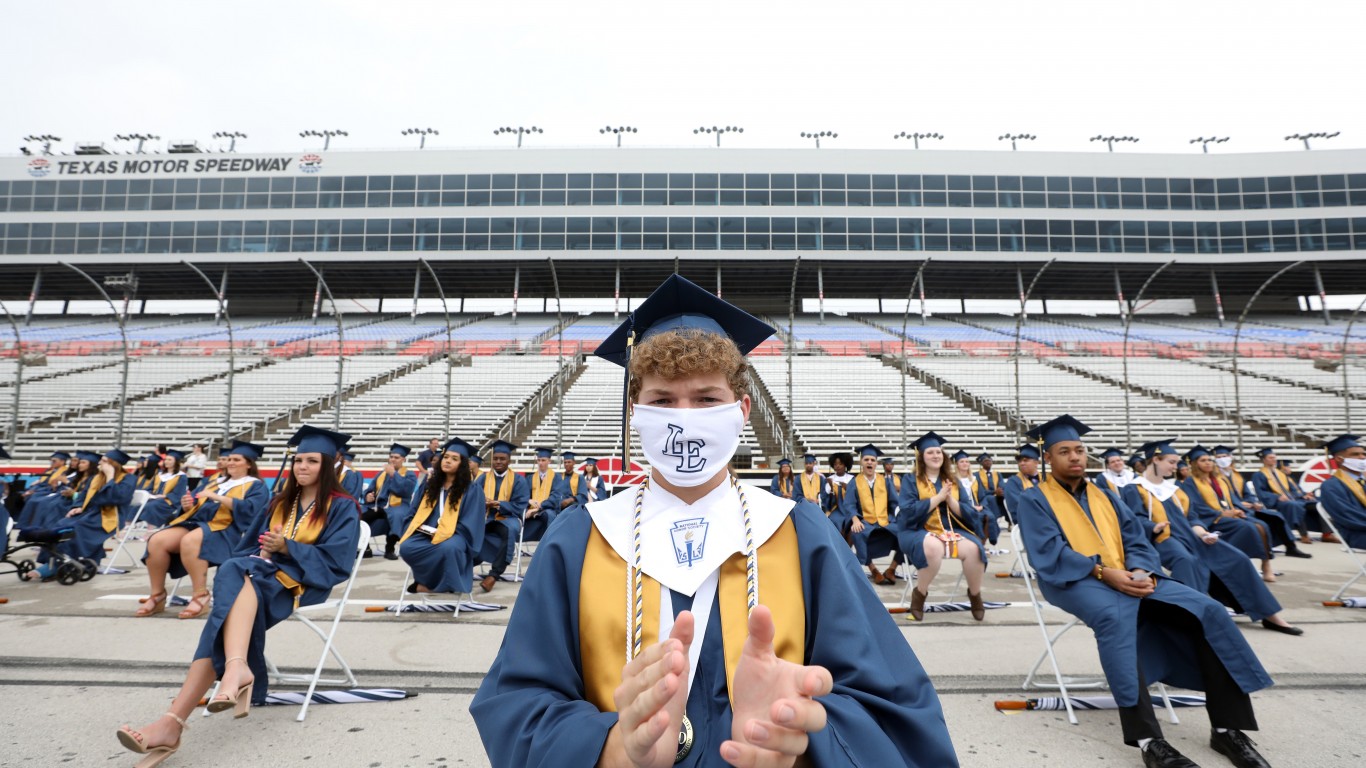
Texas
> Current measures taken: New schools can’t opt-in to the K-12 COVID Testing Project to receive rapid tests. Those already in will continue to receive them. Enrollment has fallen as schools across the state.
> Health screening recommendations: Symptom self-screening for staff
> COVID-19 cases as of Feb 8: 8,680 per 100,000 people — 24th highest (total: 2,491,227)
> Change avg. daily cases, Jan 31 – Feb 7: 5.2% — 2nd largest increase (from 2,360,632 to 2,483,742)
> Vaccine 2 doses administered as of Feb 8: 2,811 per 100,000 people — 23rd lowest (total: 806,885)
> Population: 28.7 million
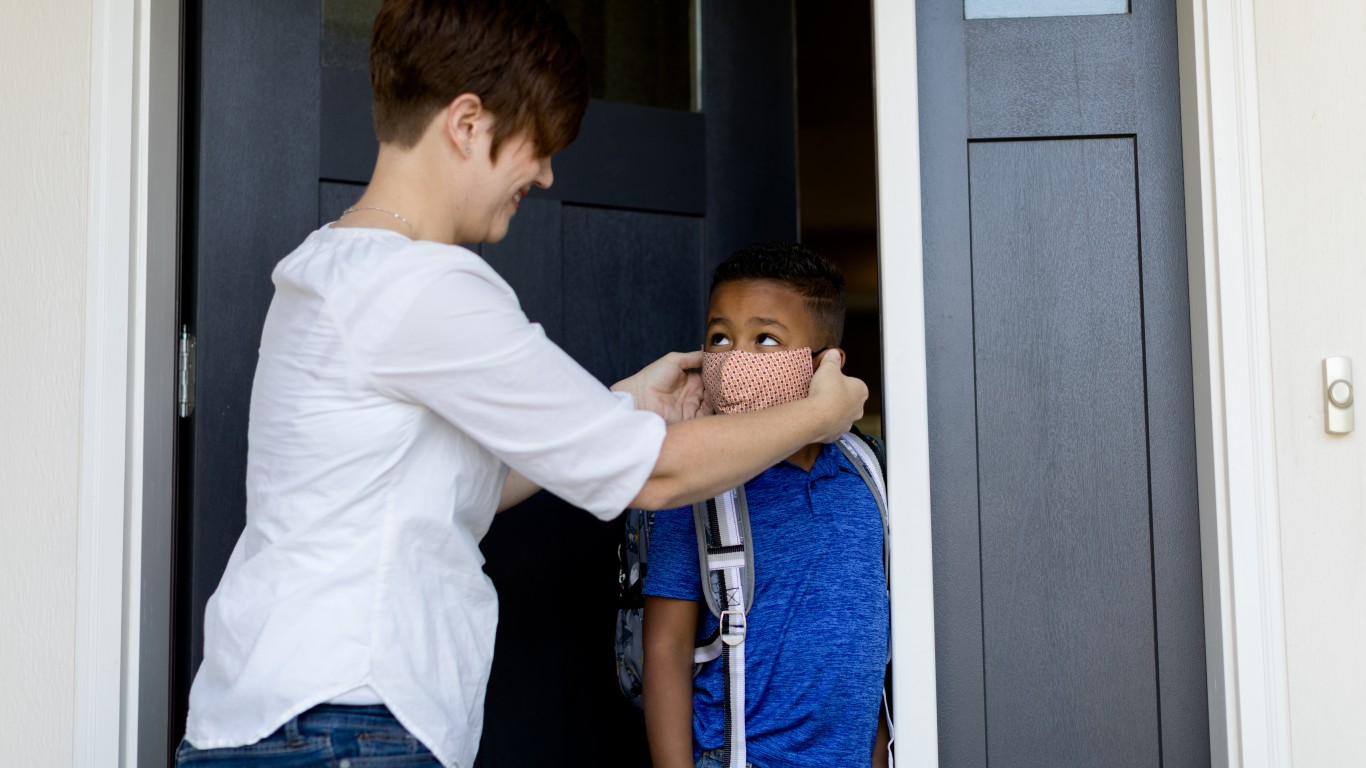
Utah
> Current measures taken: Teachers are now eligible for COVID-19 vaccinations. Schools in three districts were under virtual learning until the end of January or the beginning of February. Many students have changed schools during the year depending on whether they offer in-person instruction, remote learning only, or a hybrid model.
> Health screening recommendations: For students and school staff to self-monitor for symptoms
> COVID-19 cases as of Feb 8: 11,218 per 100,000 people — 3rd highest (total: 354,608)
> Change avg. daily cases, Jan 31 – Feb 7: 2.3% — 18th smallest increase (from 346,624 to 354,608)
> Vaccine 2 doses administered as of Feb 8: 3,299 per 100,000 people — 18th highest (total: 104,274)
> Population: 3.2 million
[in-text-ad-2]
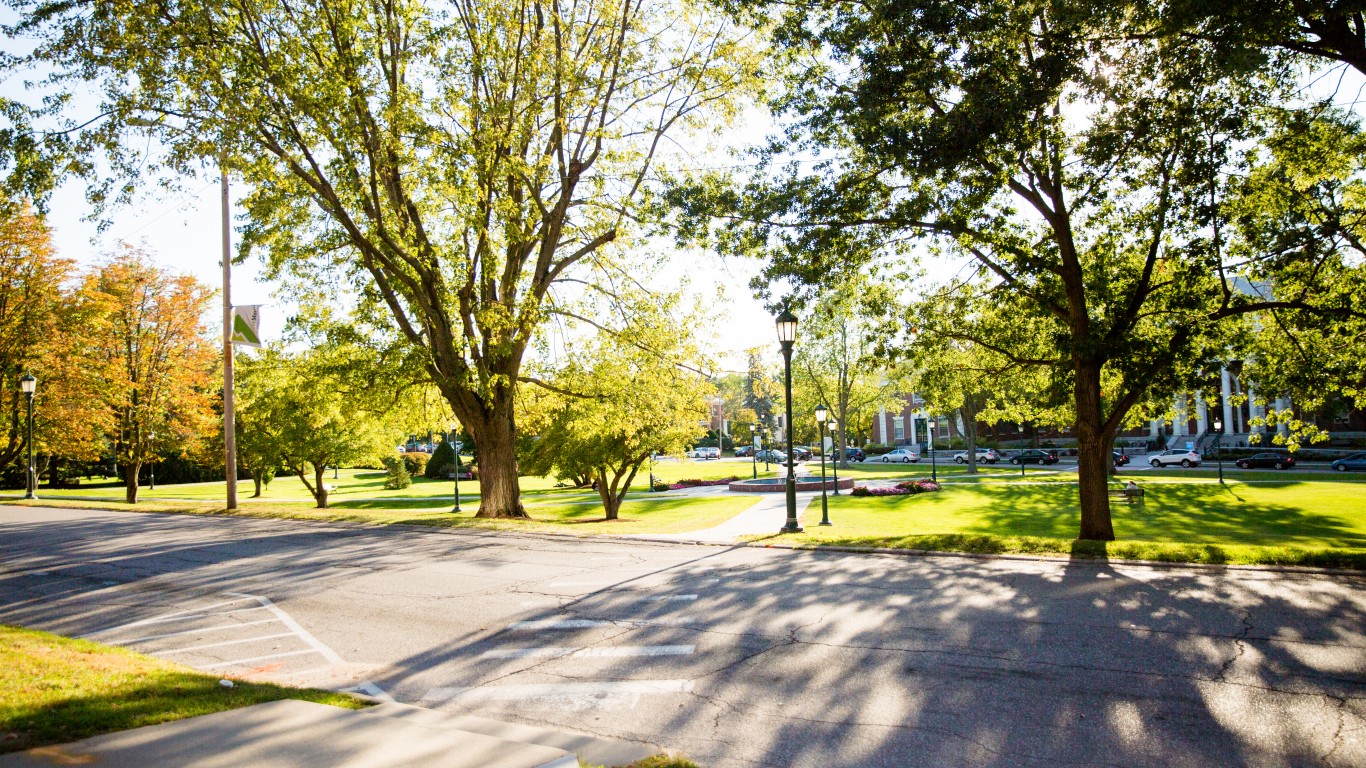
Vermont
> Current measures taken: Asymptomatic teachers and staff members at all public schools in Vermont can take an on-site COVID-19 test.
> Health screening recommendations: Daily symptom screening at home
> COVID-19 cases as of Feb 8: 2,083 per 100,000 people — 2nd lowest (total: 13,046)
> Change avg. daily cases, Jan 31 – Feb 7: 7.8% — the largest increase (from 11,965 to 12,900)
> Vaccine 2 doses administered as of Feb 8: 4,334 per 100,000 people — 5th highest (total: 27,144)
> Population: 626,000
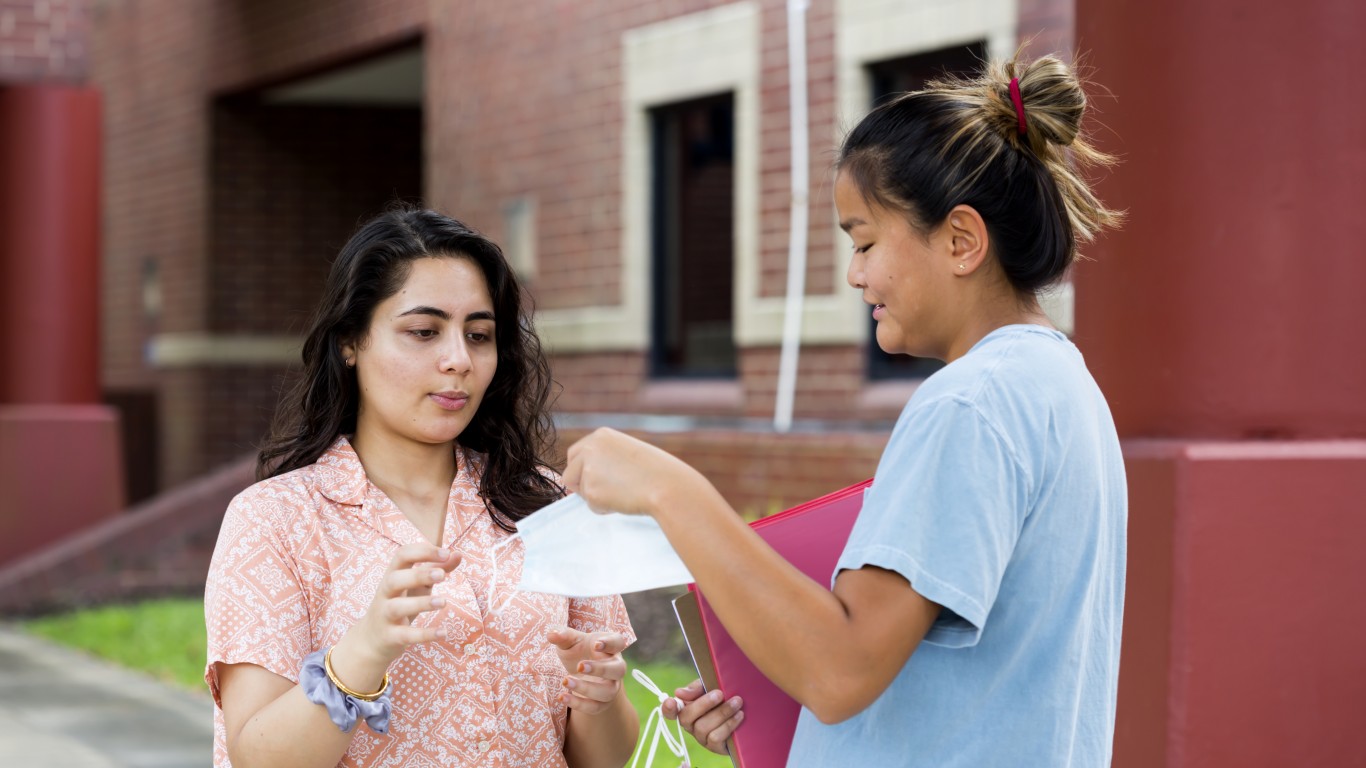
Virginia
> Current measures taken: Henrico County Schools delayed in-person reopening. Fairfax County Public Schools moved some students to full-time remote learning. Gov. Ralph Northam directed all schools to offer some in-person learning by March 15, and consider summer school to make up for lost time.
> Health screening recommendations: Daily symptom screenings
> COVID-19 cases as of Feb 8: 6,232 per 100,000 people — 9th lowest (total: 530,825)
> Change avg. daily cases, Jan 31 – Feb 7: 4.8% — 5th largest increase (from 504,779 to 529,125)
> Vaccine 2 doses administered as of Feb 8: 2,455 per 100,000 people — 13th lowest (total: 209,104)
> Population: 8.5 million
[in-text-ad]
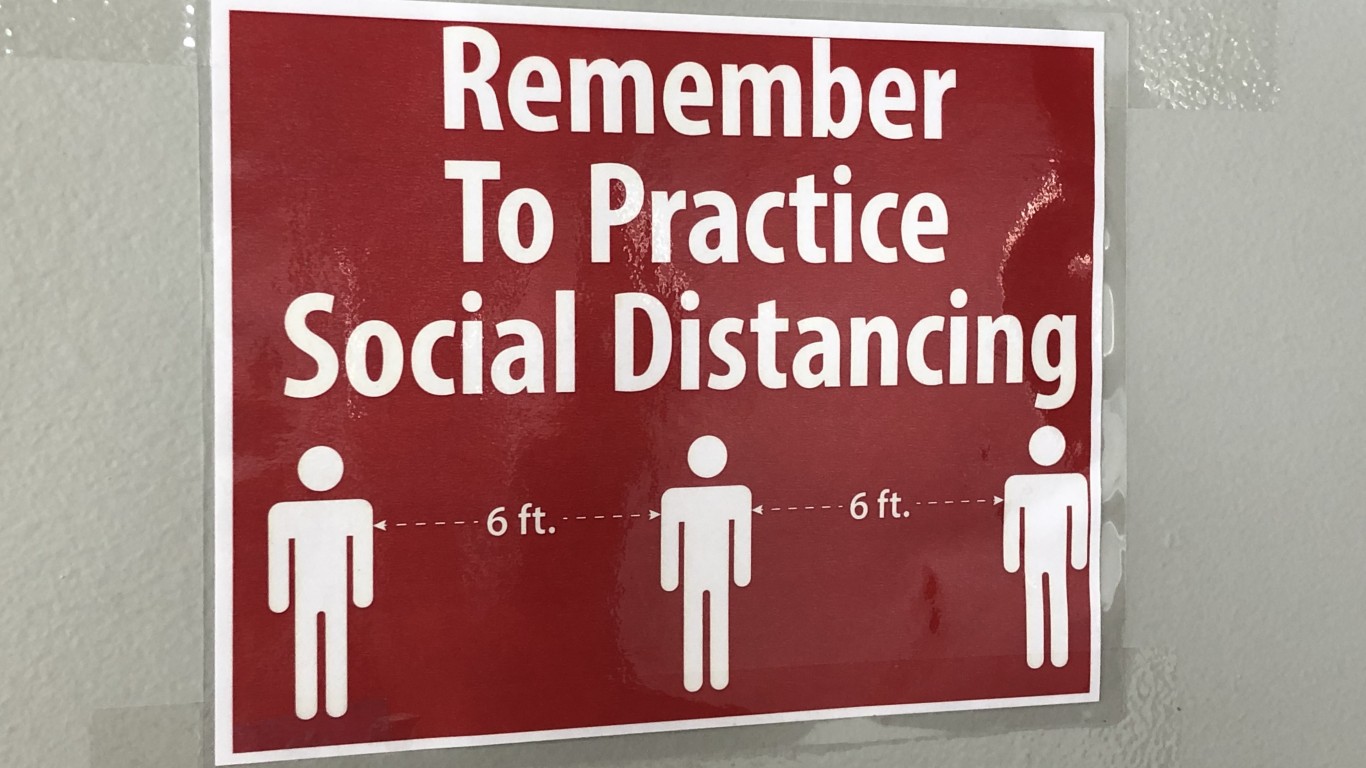
Washington
> Current measures taken: Health officials recommended holding off on expanding in-person learning due to resurgence of COVID-19 cases. Public school in Seattle delayed reopening for in-person instruction until Jan 28.
> Health screening recommendations: Daily symptom screening and temperature checks
> COVID-19 cases as of Feb 8: 4,248 per 100,000 people — 5th lowest (total: 320,146)
> Change avg. daily cases, Jan 31 – Feb 7: 2.7% — 25th smallest increase (from 311,597 to 320,146)
> Vaccine 2 doses administered as of Feb 8: 2,570 per 100,000 people — 18th lowest (total: 193,678)
> Population: 7.5 million
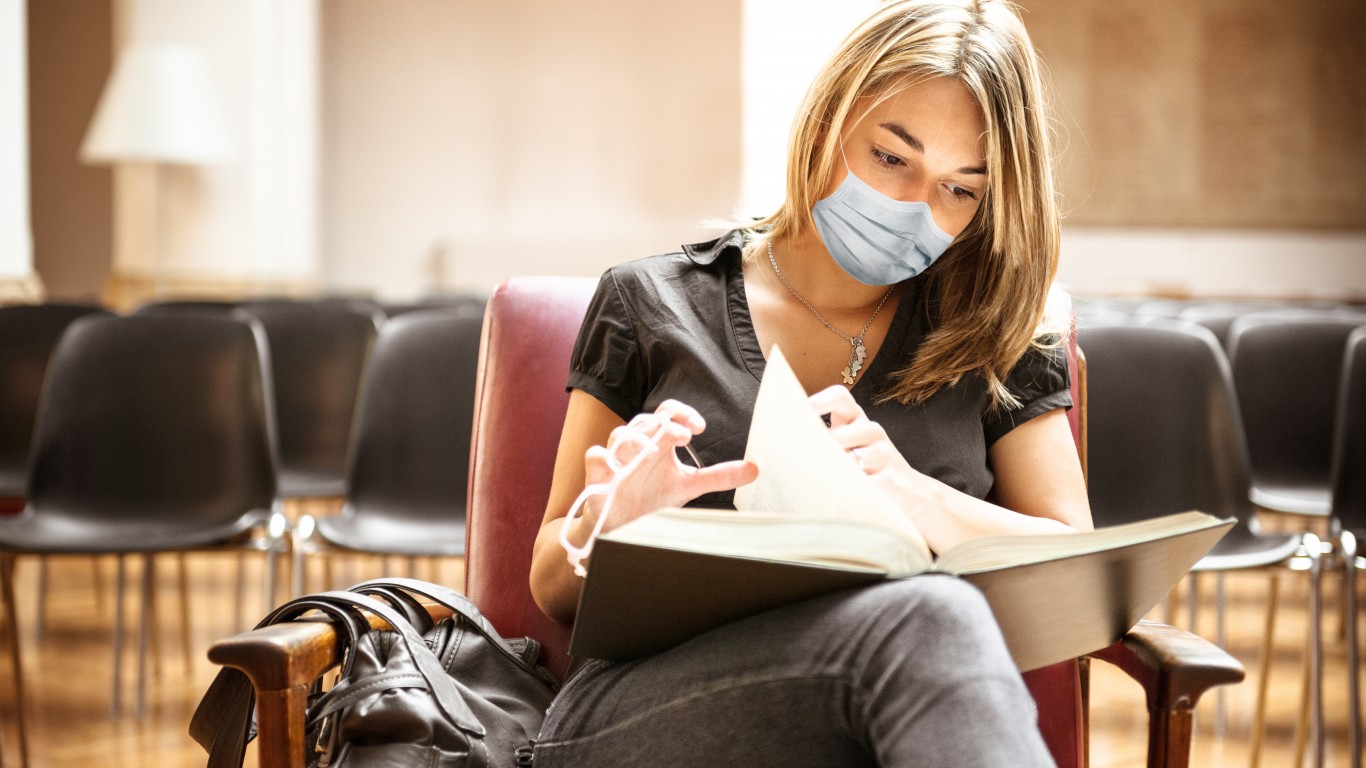
West Virginia
> Current measures taken: Elementary, middle, and many high schools started reopening for in-person instruction on Jan 19.
> Health screening recommendations: Daily symptom screening and temperature checks
> COVID-19 cases as of Feb 8: 6,928 per 100,000 people — 11th lowest (total: 125,106)
> Change avg. daily cases, Jan 31 – Feb 7: 3.1% — 20th largest increase (from 121,001 to 124,708)
> Vaccine 2 doses administered as of Feb 8: 5,798 per 100,000 people — the highest (total: 104,711)
> Population: 1.8 million
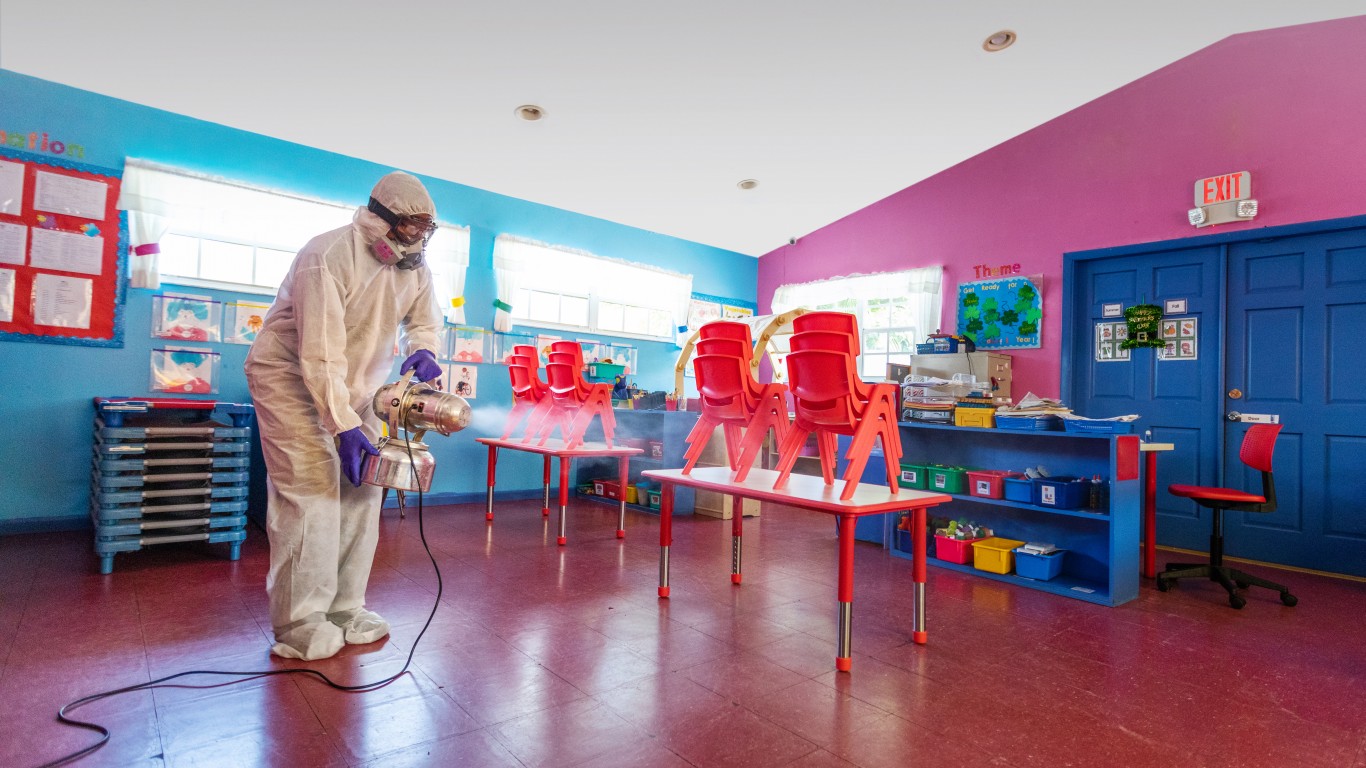
Wisconsin
> Current measures taken: Pre-K-8 schools will attend in-person instruction regardless of their county’s level of transmission. Counties are encouraged to resume in-person instruction at least two, preferably four or five, days per week.
> Health screening recommendations: Daily symptom screening and temperature checks recommended
> COVID-19 cases as of Feb 8: 9,458 per 100,000 people — 14th highest (total: 549,826)
> Change avg. daily cases, Jan 31 – Feb 7: 1.4% — 4th smallest increase (from 542,415 to 549,826)
> Vaccine 2 doses administered as of Feb 8: 2,738 per 100,000 people — 22nd lowest (total: 159,160)
> Population: 5.8 million
[in-text-ad-2]
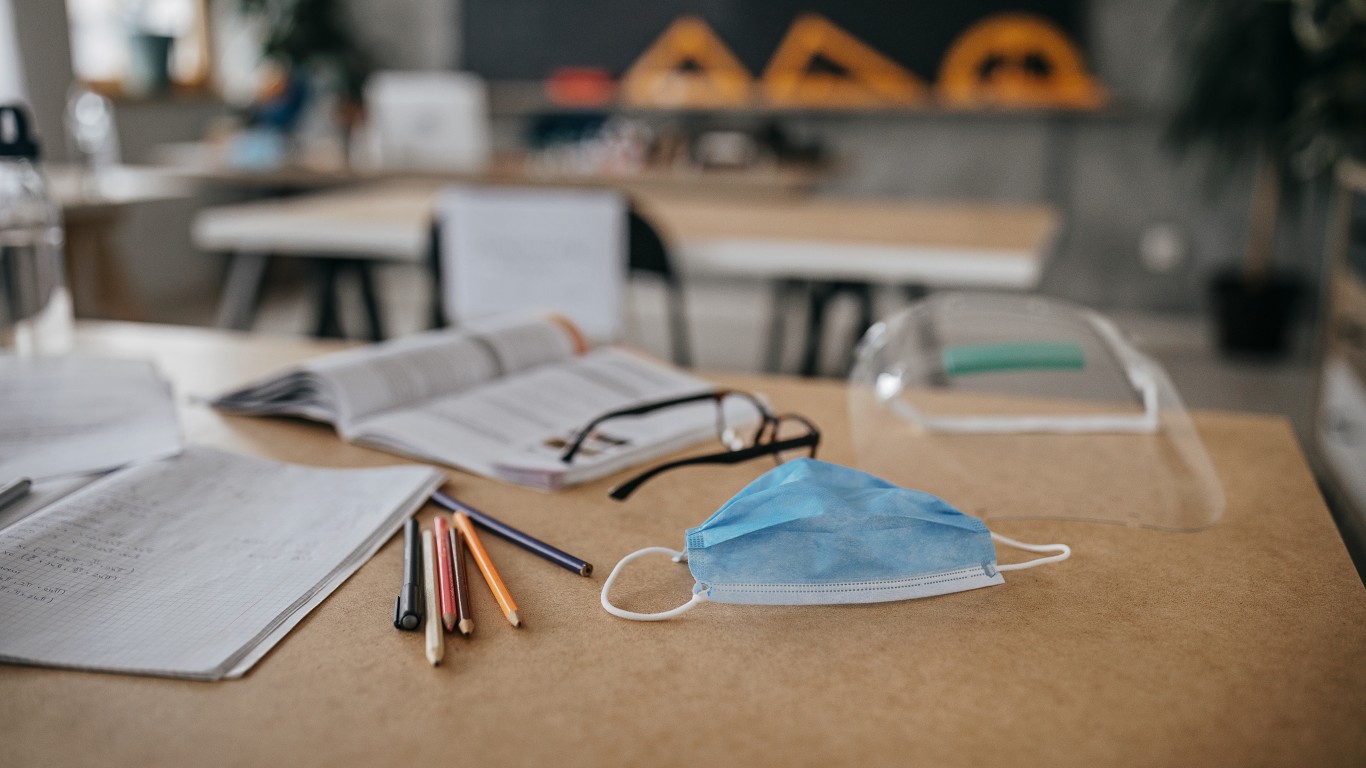
Wyoming
> Current measures taken: Students don’t have to quarantine if, when exposed, both the infected student and close contacts were wearing face coverings.
> Health screening recommendations: Each school district to come up with its own safety measures
> COVID-19 cases as of Feb 8: 9,109 per 100,000 people — 19th highest (total: 52,627)
> Change avg. daily cases, Jan 31 – Feb 7: 1.4% — 6th smallest increase (from 51,912 to 52,627)
> Vaccine 2 doses administered as of Feb 8: 2,896 per 100,000 people — 23rd highest (total: 16,729)
> Population: 578,000
The Average American Is Losing Momentum On Their Savings Every Day (Sponsor)
If you’re like many Americans and keep your money ‘safe’ in a checking or savings account, think again. The average yield on a savings account is a paltry .4%1 today. Checking accounts are even worse.
But there is good news. To win qualified customers, some accounts are paying more than 7x the national average. That’s an incredible way to keep your money safe and earn more at the same time. Our top pick for high yield savings accounts includes other benefits as well. You can earn a $200 bonus and up to 7X the national average with qualifying deposits. Terms apply. Member, FDIC.
Click here to see how much more you could be earning on your savings today. It takes just a few minutes to open an account to make your money work for you.
Thank you for reading! Have some feedback for us?
Contact the 24/7 Wall St. editorial team.